Text
Fandom's weaponising of "-coded" to mean "my interpretation (headcanon) is factual and correct and anyone who disagrees with it is [something]ist" is deeply annoying and also... yeah it probably is a bit problematic that we've so muddied the waters on what is and isn't intentional in media works and on whether an interpretation is automatically correct because it appears to tick whatever boxes are currently popular.
#“coding” is a verb which as you know from school is a Doing Word and so coding has to be Done by someone#what you mean in most cases is “this characters comes across as” or “this character can be interpreted as”#coding also *usually* happens when openly making a character a thing is impossible for some reason (social stigma for instance)#i am *convinced* that Default Hawkeye is bisexual but i've never seen anything to suggest he's “supposed to be” you know?#and i feel like by now someone involved would have said if he was#you know?#all this is even leaving aside that “word of god” can be a very tricky topic with a collaborative medium like television#if a writer says something about a character but the actor and director disagree then who's right? etc#literally saw a tumblerite attempt to win an argument with “but Loki is PoC-coded” believing most marginalised = winner#and i just... look if a 21st century movie franchise “coded” that and hired a white actor to do so... is THAT not massively fucked up???#it's bollocks but if that WAS a thing i don't think it'd be the automatic win that you seem to have thought it would be u kno??#basically not everything SHOULD be coded at this point anyway
28 notes
·
View notes
Text
Who Wants To Talk About Japanese Orthography In Manga???




Me, it's me, I do, and I have been chomping at the bit to get the chance to.
Orthography refers to the conventions of written language to represent sounds. That may bring to mind the idea of rigid grammar rules or spelling standardization, but in a linguistic sense, orthography simply describes observable trends across language use. This isn't about authority--I am not going to talk about what schools teach or say people should write one way or another. This is about examining how real people use written language creatively to convey different things in popular media.
This is a huge topic, so I'm only going to use examples from MHA to highlight Horikoshi's style.
First, let's get a run-down of the main parts of written Japanese and how they tend to be used.
We've got kanji and kana; kanji are logograms, while kana are syllabaries. Kana refers to both hiragana and katakana collectively, but we will delineate the two from here on.

The Wikipedia page for kanji, describing this more succinctly than I'm about to.
For clarity, I'm gonna color-code each one.

Let's take a quick look at all three in action.

Chapter 65
By virtue of being the syllabary that grammar particles are written in, hiragana can get away with a lot that kanji and katakana can't.
You can write simple sentences in hiragana alone, like so:
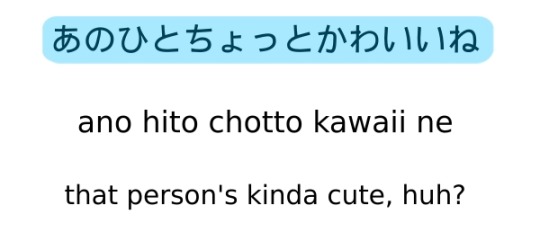
The sentence is perfectly comprehensible like this, but it reads as casual or perhaps a bit immature, like the person is either leaving out kanji for speed or simplicity (like online) or they aren't confident using kanji. Although, the word hito (person) is extremely common and its kanji is simple, so this would probably look more natural:

But there are also kanji for the word kawaii, so you could also write it this way:

On the other hand, writing the whole thing in katakana looks weird as fuck:

bECAuSE iT kINDA reADS LIKE THis, or maybe L I K E T H I S
It seems almost alien, overemphasizing the phonetic sound of the words, implying there's something notable or unusual about them.
But what if you write it like this?

Both ways use katakana to put flavor on a specific word. The first puts it on person, which could be used in a situation where someone hasn't been named yet, but the speaker tonally emphasizes your knowledge of them--like "oh, you know who."
The second emphasizes cute, which could read as sexually suggestive, teasing/joking, or even a threatening tone, depending on the context. "Real cute, ain't they?"
Basically, the connecting grammar bits need to be in hiragana, but nouns, verbs, and adjectives can typically be written in any of the three systems. That introduces choice into the matter, and these choices may have some cultural connotations.
This is a subtlety in written Japanese that manga loves to take advantage of. Orthography contributes a lot to characterization and tone, so individual creators develop little quirks as part of their own writing style.
Now let's finally take a gander at some of Horikoshi's!
Kanji instead of hiragana for semantic emphasis

Chapter 48
Best Jeanist could have used only hiragana for the word "good" (いい, ii), which is a very common way to write it. But he's not just commenting that they are nice kids, he's talking about them as "goodie two-shoes" and even puts brackets around the idea. The kanji emphasizes the cultural idea of a Good Child™, a well-behaved, morally upright, obedient young person.
Kanji instead of hiragana denoting a serious or severe tone

Chapter 36
Katsuki's "you" pronoun omae being written with kanji comes across as markedly serious, especially compared to how his dialogue is normally written. This is actually the only time Katsuki says omae and it is written with kanji--all the rest are in hiragana, which tends to read as more casual.
Hiragana instead of kanji denoting a gentle tone or youthful/childlike language
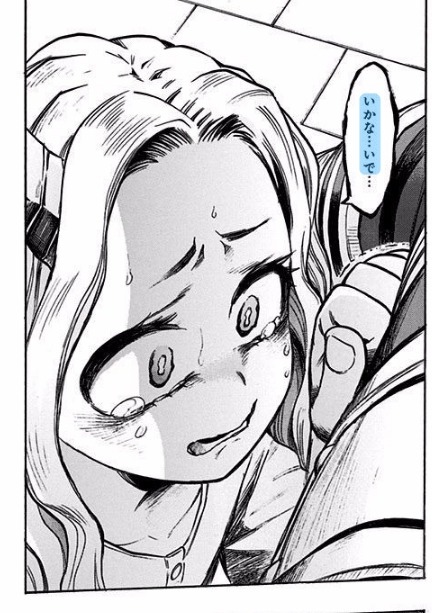

Chapters 129 and 183
Katsuki and his omae show us how kanji use can be seen as more mature and serious; Eri's dialogue does the opposite of this by using hiragana when it could use kanji, emphasizing her youth and innocence.
Katakana instead of hiragana or kanji for emphasis or slang
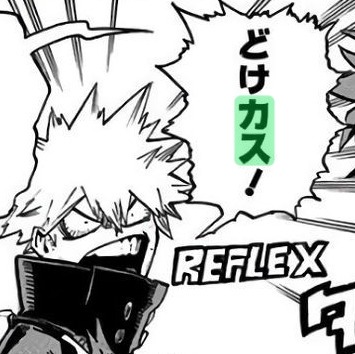

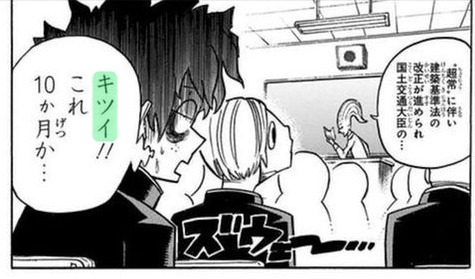
Chapters 209, 207, and 2
As I detailed above, one of katakana's most common uses is similar to italics or all-caps.
But you also tend to see slang written with it, and depending on the slang, the word being in katakana can immediately clarify it from other, perhaps more standard meanings. In Jirou's case, her personal pronoun uchi can mean a couple other things, so it being written in katakana clarifies her usage. It could arguably also imply she is taking a bit of an argumentative tone--Katsuki's slang is typically written in katakana for both of these reasons!
Katakana denoting regional dialect/accent, nonstandard pronunciation/muddled speech, or confused articulation





Chapters 102, 208, 394, and 2
Ochako gets flustered and defaults to her regional Kansai dialect. Instead of "chigau wa" (Tokyo dialect), she says "chau wa" repeatedly.
Katsuki and Toga both drop the w- sound from a word. Katsuki says "ore a" instead of "ore wa," while Toga says the word "kawaiku" as "ka'aiku" and "kawaii" as "ka'aii." Notice how the katakana which represents the vocal omission/hiccup is actually smaller than the others? That's also a little stylistic detail for communicating this kind of nonstandard speech.
Izuku repeats All Might's words, chikara wo, in a confused daze because he isn't following All Might's point. By removing the kanji especially, this kind of katakana emphasizes him sounding the words out without recognizing the underlying meaning.
Basically, Japanese has some excellent ~vibes-based~ orthography because of how the language is structured!
Of course, you find this kind of thing in English as well--especially in the age of the internet, where people note that "how dare u" reads as tonally distinct from "how dare you." As you develop language fluency, you tend to pick up these things subconsciously more than anything, but it's one of my favorite things to analyze and compare.
These are just a few examples and my own interpretations of them. I'm sure there are many more uses and flavor-nuance I'm not picking up on. Since any given choice can be read a few different ways, context is very important. My examples aren't definitive proof of anything, but it can be fun to keep these kinds of details in mind while reading.
Shueisha and Shonen Jump surely have in-house standards for text, and mangaka must operate within that range. That said, I have indeed seen every one of these examples in other manga as well.
And on the independent side of things, doujinshi and online manga are basically the wild frickin' west--I have seen tons of totally crazy, highly creative ways to take advantage of the unique flexibility found in Japanese, but that's a post for another day.
I will probably write more about this kind of thing in the future when I can pinpoint some more observations, but I hope you all enjoyed the ride. <3
#meta#linguistics party#this is the nerdiest shit I've ever written and I'm not sorry#I find this soooooo fascinating and fun to think about#people are so cute we think of all kinds of ways to properly convey ideas and feelings and reference shared cultural information#almost all human languages are first and foremost spoken out loud#and human beings get so creative trying to figure out how to express all the complex minute details contained within verbal communication#through the written word#mha 2#mha 36#mha 48#mha 65#mha 102#mha 129#mha 183#mha 207#mha 208#mha 209#mha 394
173 notes
·
View notes
Text
Masterlist: Polls (non-Star Wars)
Navigation Post
Fun fact, tumblr allows 250 links on the old editor and 100 in the new. So. Network of masterlists.
Make a Choice!
Your favorite character is a mad scientist of the engineering subspecies. As a child, teenager, or sleep-deprived young adult, what random appliance have they taken apart and possibly set on fire in the course of trying to "improve it?" New and unanticipated sentience for the appliance optional.
Anti-plagiarism check! Pick your favorite citation format.
You can only pick one: Jokes about how white people don't know how to spice or season food. Jokes about how white people shotgun cinnamon the second September hits.
Is it vaguely dystopian for large elementary and secondary schools to have numbers instead of/before names? (e.g. the students of PS 91Q only know it by that code, not Richard Arkwright)
How long does a daily commute ROUND TRIP need to be to qualify as 'long'?
It is easier to change... your appearance OR your personality
When you see DSM-V, how do you pronounce it.
microwaving water for tea
Everyone Pick The Same Number
Writing and fandom polls!
Posting WIPs or unfinished works?
Best non-standard narrative format (that I've personally used)?
How well do you know omegaverse?
What does "it reads like bad fanfiction" mean to you, WHEN YOU SEE IT IN THE WILD, assuming no context?
What do you mean when YOU say "it reads like bad fanfiction," assuming no other context? (Unfortunately, typo messed it up)
Have you ever posted something Anonymously on AO3? (Not counting temporary anonymity for events.)
Tell me about your culture (and opinions on such)!
Did your school have you do a Mole project where, while learning what an atomic mole was, you took home a pattern and made a stuffed mole (animal)?
How close is your nearest grocery store? (Or farmer's market, fruit stand, butcher, etc. Food shop that is not a restaurant.)
Did you have to stand and recite a Pledge of Allegiance type thing to your country of residence in elementary school (and possibly beyond)
Taking off shoes on an airplane
Favorite elementary/middle school "everyone just learned a new body part" phrase
Did you know that bagels are a whole Thing and just as important to the New Yorker identity as pizza, if not more so?
Is "Whistling will bring mice into the house" a thing for you guys?
Do schools in your area do active shooter drills?
Does your culture/region have 'ants on a log' as a snack? (contains peanut butter brand discourse)
Do you do egg battles?
Tell me about yourself!
Think of your favorite band! Make sure it it is a band and not a solo artist. Now tell me the gender breakdown.
If you're trans, what's your preferred way to finish this sentence?
Pronounce "Sixth"
When you see the letter J in an unfamiliar word that you don't know the origin of, how do you pronounce it? (Assume you are reading a text in English.)
How important is the eco-friendliness fabric content to you when buying clothes?
What is your least favorite kind of makeup to put on?
Did you ever go to a big box store with your parents, get bored, and decide to take your blood pressure at the kiosk while you waited for them to finish?
A question for the pals who grew up bilingual: Have you ever had to translate from 'the language of the home country' to 'the language of where we live now' for your immigrant parents?
Last app you downloaded?
Can you reliably identify the various national blue/red/white tricolor stripe flags? (e.g. France, Russia, Netherlands, Serbia, and so on.)
Which of my "childish for someone over 21" traits are you?
Which syllable do you stress when saying Zagreb?
Do you ever heat up your milk* for cereal? - In defense of Panda Puffs
First grey hairs?
Ladies, where do you buy (most of) your undies?
How tempted are you pronounce processes (the plural of process, not the verb) as "PRO-seh-SEES" when you write it out?
Which New Doctor Who companion First Meeting™ career are you?
What are you willingly sacrificing DESPITE it being important* to you the next time you go to the hair salon/fuck it up in the bathroom?
What's your comfort/background noise show that you can rewatch indefinitely to turn off your brain a bit?
How often do you wash your bra?
How often do you change/wash your sheets?
Oh shit, the peanut butter you just opened is separated, and you need to mix the oil back in with the rest. How?
Mayonnaise
Nonsense!
let's make a bell curve!
But I am le tired... 🚬
I use an Android because
Blood on ya undies (funny phrasing)
If you're NEW to tumblr (like joined in the last two or three years), are you seeking out guides on how to engage with tumblr?
Without context, FTW stands for
Rocky Mountain Oysters
Is pilaf/pilav* a casserole?
Tag meme, not a poll: Who’s your fake late spouse?
9 notes
·
View notes
Text
Unhinged Klance Shenanigans #1
While working on my posts, I do a lot of research. My schooling involved research to support my ideas. I like to find anything that can back up what I say or confirm any Klance news. I like to be accurate, transparent, and thorough. If any official VLD news comes out that Klances does happen post show and confirms all of the supposed "Klance coded" moments, then I'll admit I was wrong.
But I still won't ship them because, in my opinion, they're not good for each other and would not last long in a relationship for various reasons. That's a blog post for another day.
Anyway,
I came across this while researching ... and I was just floored.


"As human beings, we deserve the right to have Klance be canon."
Much entitlement. Such audacity.
Let's take a look at the language here. (This is my speciality.)
Deserve is a verb. It stems from an Old French word, deservir - deserve, be worthy of, earn, merit.
Interestingly, deservir comes from the Latin deservire - serve well, serve zealously.
Breaking deservir down: the suffix de = completely, and servire = to serve.
And, according to Etymonline (my favorite website ever WHICH NOW HAS A MOBILE APP), the Latin sense of the world evolved from "to completely serve/serve completely" to "be entitled to because of good service," and then to the French "be worthy of."
This is a LOT to unpack.
Firstly, let's take a look at the original meaning of the Latin deservire: serve well, serve zealously.
I think it's pretty known that Klancers serve their ship pretty zealously. Almost to the point where it's a little scary. Maybe even a little cultish.
As much as I love VLD, making my own head canons, and acknowledging how much it means to me as a person, I do know that it is fiction. Just because something is fiction doesn't make it less valid or important. Saying "It's just a show" severely invalidates how deeply it has impacted people. But, at the end of the day, Voltron is a beautiful piece of fiction that has been shared with the world.
A fictional ship that has such a chokehold on you that you make a petition to get it canonized ... that's overkill.
And it can't be said that the majority of Klancers serve their ship well. Because raise your hand if you've seen Klancers bully people for not shipping Klance, or you have been personally bullied by a Klancer.

That brings about my second point concerning the modern day meaning of deserve: to be worthy of."
Frankly, because of the bad Klancer attitudes, they don't deserve to have Klance canonized. They're not worthy enough to have that ship canonized because their vitriol kinda dragged down the fandom.
This is what I mean about being tired of Klance shipper attitudes. Being a human being does not entitle you to have your preferred ship be canon.

As a human being, you deserve health, prosperity, love, and kindness.
DreamWorks would never take this seriously and I'm glad this petition didn't go anywhere.
Suggestion for the future: if you want to start a peition, your name really should be on it, because that's one way to show you genuinely stand behind what you're petitioning for. Notgivingmynameforprivacyreasons, I wish you luck in your future endeavors.
Also, I don't see any credit given to Ikimaru for the Klance art that was used. I may not be a Klance shipper, but I think her art is beautiful. (See? Even as a non-Klance shipper I can validate her art and see the beauty in it.) I even considered commissioning her for a time, before I realized she doesn't do commissions anymore (at least, last I checked), and after thinking it over figured Ikimaru probably wouldn't accept a non-Klance VLD commission. And that's completely okay.
#Voltron#VLD#Voltron: Legendary Defender#Klance#Deconstructing Klance#Klance Is Not Canon King#Is Klance a cult?#the audacity
3 notes
·
View notes
Text
Week # 10 Business Progress
What is working?
My first "sales transaction" went rather well.
Last week, on May 2, I had my first session with a student whom, for the sake of anonymity, I will call Johnny Appleseed. Little Johnny has an upcoming exam for grade 10 French and, while his class is working on an ISU currently, his mother is concerned that he's forgetting all of the tenses he has learned earlier this year. It turns out that Johnny does see the value in being bilingual (members of his extended family are bilingual, for one, but he also sees it as a marketable skill from a career perspective, which is a mature way of thinking for a boy of 15). His issue is more along the lines of spoken French vs. written French. Johnny feels that learning within the classroom is stunting his ability to speak French because he's "just more inclined to speak it than everyone else seems to be." I acknowledged the value of conversational French, but asked him to consider the importance of knowing how to read and write it clearly and for him to self-assess his capacity to do so.
I think that helped because, by asking him not to tell me but to evaluate himself and to be brutally honest in that regard, he felt more empowered than the top-down experience in which he's been enmeshed. I think the relationship has been quite tense between parent and child over this particular point, but Johnny does not outright hate French so much as having frustrations about the pedagogy surrounding it at his school.
I count this as a win, because the problem is not with learning French. The problem is more complex than that and involves appreciating the need to understand and communicate with the written word. We reviewed using the past and present tense, including using negatives, for reflexive reciprocal verbs, which he self-identified as an area of trouble. Again, allowing him to tell me his weaker areas seemed to have an empowering effect where he felt more in control of his educational pursuit.
Over the next few weeks, we will move through each part of the curriculum; I will be able to then evaluate areas of strength and weakness and provide added support where I can see it is most needed.
The client, Mrs. Appleseed, thanked me profusely when we chatted after the session. Her gratitude was very kind and I gave Mrs. Appleseed a few business cards to “refer me to your friends.” (You have to try, right?)
She also mentioned in a week or two ramping up the number of sessions as we enter into his final exam period. We scheduled again, this time for tomorrow, Wednesday, May 8, another hour-long session. She e-transferred the funds for the first session immediately as well.
In an Excel spreadsheet, I am keeping track of all of the financials of the business, including cash flow, to ensure I am meeting my intended objectives. Like I mentioned last week, I’m also trying to absorb as much intel as I can from the Appleseeds, so I can understand best about what works well and what doesn’t with my current business model, and whether there are adjustments I can make to improve the business viability.
What is not working?
More clients would be nice. Diversifying my clientele seems like a more sustainable way to move forward. I don’t want to put too many eggs in one basket.
youtube
If bad news is your thing, though, then marketing will interest you. I am still getting absolutely nowhere with Facebook. My frustration with social media is insane right now. (Not that I would feel much better by getting set up to properly engage with it. But I digress.)
I did spend some money on business cards (and less than I'd budgeted, thanks to a coupon code), so I am relying, unfortunately, a little too heavily on passing these cards around wherever I can. I know word-of-mouth is absolute gold, especially in the tutoring industry, for netting more clients, but I am feeling a little desperate to supplement it with some social media or other kinds of marketing. (More on canvassing with flyers below.)
I truly expected the marketing process to be more organic than it has been, so I am genuinely surprised at the number of speed bumps I’ve faced along the way here. My goal by next week is to have something more concrete figured out, even if it means switching gears entirely and seeking out another paid marketing campaign option outside of Facebook.
How do you feel the project is coming?
Can't complain.
Based on my metrics, I’ve met my goals so far. My natural personality doesn’t gel well with the “let it be” mantra I’m force-feeding myself, but I am trying to learn to let go a little and not try to jump the gun on my milestones.
There’s still much room for progress, but I also need to give it room to progress.
What are you learning about running a business?
It should come as no surprise that I have learned that I would really like to be able to afford the services of a marketing firm. The ability to know my weaknesses and pain points and being able to offload them to someone with the expertise and connections to get it done right the first time – what a blissful dream.
Honestly, I'm starting to understand why Don Draper was such a big deal.
youtube
In the world of regulations and bylaws, I also made some strides in learning where I can hand out flyers. A terrific municipal law enforcement officer got back to me on April 29 stating that, in Ajax, no municipal bylaw exists prohibiting me from handing out flyers in public. However, I cannot hand out flyers or any other promotional materials on Town of Ajax property, any property classified as a park, and any Town of Ajax recreational facilities. By virtue of that, I might consider handing out flyers later this week; the weather is pretty nice right now and the foot traffic is increasing, so it might be wise to do that for a few hours.
What are you learning about yourself?
I am learning a lot of four-letter words, but one of the most important ones has been “calm”... oh, here’s two more: “Slow down”.
Being as Type-A as I am, I have to learn to pace myself for a marathon, not a sprint. I have managed to seemingly get the most steps forward when I’ve stopped and smelled the roses. So, I am aiming to keep doing that, in spite of myself.
Quite honestly, rewiring that part of my brain would not necessarily be a bad thing. I understand there’s a difference between eustress (the good kind of stress that keeps us alert and alive) and distress (the debilitating kind that brings us to our knees and wreaks havoc on productivity and wellbeing), but I cannot always tell the difference between grit and grind.
youtube
In my experience, when you’re in it, you can’t see the forest for the trees. So, if nothing else, if this startup venture is an abject failure, I will walk away from it with a better sense of calmness. Nothing is ever a total loss, if we can learn or change for the better due to it.
#entrepreneur#startup#venture#entrepreneurship#marketing#customerpersona#sales#regulatorycompliance#regulations#bylaw#Youtube
1 note
·
View note
Text
Ezra 8: 1-3. "Spoiled in Winter," and why we need to talk about the Tanankh.

The documents we call the Old Testament contain Hebrew Math known as Gematria. Without proper definitions of every Hebrew word within and translation of certain terms into their mathematical coefficients, the Bible simply cannot be properly understood.
It is reckless and irresponsible to stand in front of a class or congregation and discuss the Bible while reading words no one understands, purporting to convey the pristine nature of the Spirit of God and interpret His ideals for us.
Here is an example from Ezra 8: Read this to yourself and see if you know what it means. Be honest, you have no idea.
Descendents explain how different skill sets and sequences of events become instructions to mankind, how it should guide itself. Family heads are "Noble Skills" offspring relay ways they translate into a noble lifestyle. To ignore the potential with a proper translation is very, very irresponsible of clergy and this has to be addressed.
Watch how I do it. First of all, who is Ezra? Ezra means "a strong vision of support", specifically to build an enclosure, surround it and protect it with fierceness. This idea of refuge is prominent even today. God told his Hebrew Prophets we were to insist upon creating refuge. Refuge exists in the mind first: we need protection from blasphemy, lies, profanity, insults, bullshit, and we also need insulation from the elements.
Why we build homes, schools, buildings and other facilities, wire them heat and cool them and then allow walking talking rectums like Tony Perkins and Mitch McConnell call people faggots and niggers all day is beyond me, but their foul presences in our lives are reasons we continue to study the objectives of Refuge within the Bible.
Why did we allow Donald Trump to become the President after he openly threatened to lynch a black woman in Louisville KY when he was running for office? Because we do not yet comprehrend the concept of Ezra. Anytime we can shelter another human being from unnecessary suffering we follow the path of Ezra.
The letters of Ezra convert to a Gematria Value of 678, וזח, which mean "in zach." Zakar means to use religious materials and rituals to remind ourselves of God's expectations for our conduct:
"The verb זכר (zakar) means to remember, to deliberately review, or to cause to remember or review — by means of public oration, urging and pleading, physical memorials, and so on.
Noun זכר (zeker) means remembrance, memory, memorial or invocation. Noun זכרון (zikkaron) or זכרן (zikkaron) denotes a memorial or token — a memorial day, altar-plates, stones, crowns, books, proof of citizenship, even spoils of war. Noun אזכרה ('azkara) refers to a memorial-offering.
Noun זכור (zakur) and noun and adjective זכר (zakar) mean male. This noun denotes the male of humans and animals, and marvelously illustrates the parallel between sexual reproduction and the learning process, which is so overly prevalent in the Bible."
We need ezra zakar, "to review the precepts that substantiate the importance of refuge."
The Torah for these, the Instructions follow.
List of the Family Heads Returning With Ezra
8 These are the family heads and those registered with them who came up with me from Babylon during the reign of King Artaxerxes:
Babylon is the place of interstate commerce in ideas as well as a marketplace for produce etc. A Reign is brackets a series of object lessons that pertain to collection of subject matter. The Reign of King Artaxerxes "I will make the spoiled to boil, I will stir myself (in) winter" follows.
To register names means to incorporate their hidden meaning into a code of ethics. They are:
2 of the descendants of Phinehas, Gershom;
of the descendants of Ithamar, Daniel;
of the descendants of David, Hattush 3 of the descendants of Shekaniah;
of the descendants of Parosh, Zechariah, and with him were registered 150 men;
Let's start with why there are 150 Registered Men. The Value in Gematria is 3174, גאזד, gazed, "A strong wall." A wall is an identity; a Zecharia Wall is one built through remembrance of God. We are men and we are not men; until we overreach using the study of the Torah and the Tanakh, we are not really quite the men we can be. The Wall of Zechariah separates what merely looks like a man and is really a man inside.
The Number 150 has nothing to do with it, this is just the arragement of the letters needed to convey the concept. 150= אהאֶפֶס, ahapes, "the brotherhood that visualizes knowledge of peace." Ahapes shows up quite a lot in the Tanakh.
The Instructions are:
Phinehas= the Oracle
Gershom= "the temporary stranger" (strife)
The verb גרה (gara) means to strive or agitate strife, obviously not by means of one singular assault but rather by repeated provocations and withdrawals. Noun תגרה (tigra) means contention or opposition. Noun גרון (garon) is a second word for neck.
The verb גור (gur), namely — or a second and identical verb — is also often used to describe to itinerate or temporary abide. Noun גר (ger) describes an itinerant; a stranger or foreigner. Noun גרות (gerut) may describe a lodging place for foreign travelers but may also be part of the name Geruth Chimham.
Noun מגור (magor) means dwelling place or itineration. Nouns מגורה (megura) and ממגרות (mammegurot) describes storehouses, or places were goods were temporarily stored on their way to the market.
Ithamar= the Palm Coast
The Palm Coast is the bridge between the man shaped thing and the actual thing.
Daniel=
The verb דין (din) means to judge or govern. It's an old verb that mostly describes the authority of a naturally superior (because that person is wiser, stronger, older, etcetera) in contrast to the governing done by a formal government (by politically favored and appointed officials).
The noun דין (dayyan) describes one such a leader, and noun דין (din) describes anything pertaining to primitive governing: a judgment, plea, complaint, contention. Noun מדון (madon) literally describes a "place or judging" and is synonymous with the contending that goes on in such a place. Noun מדונה (medina) described the jurisdiction of one judge, and became the word for province.
David= Unity with Persistent Beauty
Hattush= What is shattered God will glue back together, from Hat hashab:
The adjective חת (hat), which is identical to the previous word and is commonly said to mean shattered or dismayed (1 Samuel 2:4, Ezekiel 32:30, Jeremiah 46:5). The masculine noun חתת (hatat), meaning terror as used in Job 6:21 only. The feminine noun חתה (hitta), meaning terror (Genesis 35:5 only). Note how this noun resembles the verb חתה (hata).
The verb חשש (hashash) means to hurry, or rather to be light-footed and hence quickly moved. Noun חשש (hashash) describes chaff, which proverbially is so light that a breath of wind carries it off swiftly.
Likewise, verb חוש (hush) means to hurry or hasten. Adverb חיש (hish) means quickly.
This verb חוש (hush) may also be used to mean to be agitated, worried or enjoyed. Although some dictionaries demand that this concerns a second, identical verb, it probably isn't and simply describes the situation that arises when people are "inspired" by either joy or fear, break composure and ride their emotions like chaff does wind.
Shekaniah= "the Thorn of God in the Eye."
Parosh=to spread out
Zechariah= Remember to review
="The Oracle, the man-shaped thing that walks along the ledge, governs in a manner of persistent beauty and glues what man has broken back together by spreading out the Words of Ha Shem, the Thorn in the Eye."
The Values in Gematria are:
v. 1: the Value in Gematria is: 7492, זדטב, zdtb, "the Lord is Just and Good."
v. 2: the Value in Gematria is: 3845, גחדה, "greed and hunger".
v. 3: the Value in Gematria is: 4849, דחדט, "rejection of the pressure."
We have discussed before how the Torah presses the juice from the grape, and from the wine, the Jewish People, come the means to house, feed, clothe, educate, employ and recreate the subjects of the human race. When we reject the pressure to do this for any reason, we obtain a way of life like ours- one that is burning down, faster and faster.
War, famine, prejudice, homelessness, all the ash constitutes a kind of pressure as well, it can indeed press the wine but only for the survivors, for the living.
More to follow.
0 notes
Text
The Change
Written by: @alliswell21
Prompt 59: Growing up Peeta started loving her. It was a gradual thing that happened throughout his childhood and into his teens. But something changes when he hits puberty. Her scent has heightened, he can spot her from miles away. He gets a bit possessive. But the biggest thing is when his body starts to heat up and even just the thought of you gets him hard for days. He finds out the family secret of his werewolf genes, something his parents thought passed him. How can he go by with his day and be with her without scaring her away by humping her because of his heat. [submitted by @animekpopxx]
Rated M: for language and “adult-y” situations.
Tags: Underage. No-Games AU. In Panem AU. Tags/Warnings will be added accordingly. Un-beta. All mistakes are mine.
Author’s Note: I really tried to write this as a one shot, but since the quarantine brought my husband and kids to work/do schooling from home, I’ve been busier than ever… and I really wanted to have something to post before the exchange was over. So here’s the first part of this story, around 2500 words.
As always, thank you to the moderators of the Exchange, you ladies are terrific as usual. Thank you to @animekpopxx for her awesome prompts, I swear your prompts are my catnip and kryptonite rolled into one.
Heads Up, there’s no verbal interaction between Everlark in this chapter.
Stay safe, everyone. Enjoy!
Chapter One:
Is ten fifteen in the morning when I start feeling feverish and thirsty. We’re in the middle of a social studies test, and I can’t keep from squirming in my chair, shaking the whole desk everytime I try to hold on to it for stability.
I catch the teacher’s eye and wince when she screeches in her affected accent for me to stop twitching.
I try to tell her I can’t help it, but before I get one word out she’s flying upon me from her own desk at the very front of the class.
“Mr. Mellark, you have exactly 5 seconds to—“ she gasps when her cold hand grasps my shoulder like a crow’s claw. “You’re burning up, Mellark!” She sounds concerned for a Capitolite, but by the way she extracts her bony hand from me, I have to think I must be burning through my thin cotton shirt. “Why did you even come to school if you were so sick, boy?” She snaps eyeing me suspiciously.
Against my better judgement, I roll my eyes. “We have a test, Ms. Greer.”
“A note from your father would’ve suffice.” She snips.
“I didn’t feel sick this morning.” I explain, embarrassed when my voice cracks lamely and the other kids try to hide their quiet chuckles, so the teacher doesn’t turn on them. The boys in my year have already grown into their adult voices, and some of them even have facial hair. Not me. I still sound and look like a baby. “I don’t feel sick right now.” I almost whine, which actually disproves my statement, because I’ve never whined about anything; whining it’s a sure way to get on my mother’s bad side, so is the first thing we Mellark’s learn to suppress and avoid at all costs.
Ms. Greer huffs impatiently, “Well, you have a terribly high fever, and you’re starting to sweat all over the place, Mr. Mellark. I’m going to have to ask you to go home until you are well again. The last thing this district needs is some epidemic tearing everything apart.” She sniffs out the last phrase, probably more concerned about missing her fat paychecks every week she stands here feeding us Capitol propaganda that’s supposed to pass as schooling, than actually worried about the district’s well being.
I try to protest about the missing the test, but this time Ms. Greer rolls her eyes and waves me off, saying that I can make it up with a two page report on coal production and its impact in District 12’s economy… as if she herself doesn’t know that our local industry is a joke, District 12 is still the poorest district in Panem, even after the Reformation a few years back, when the Capitol dissolved the Hunger Games and promised to open fair Inter District negotiations. It never happened, at least not with us, yet the whole country uses our coal.
Ms. Greer’s glaring at me though, so I pack up and start shuffling out of the classroom, only stopping to grab a note she hands me to bring to the front office.
As I footslog to the door, strange things happen that startle the shit out of me: first, a rush of smells like pine needles, sun and wildflowers invade my nose leaving me disoriented and frenzied; is a combination like nothing I’ve smelled before, but somehow, instinctively my eyes lock with the gray orbs of Katniss Everdeen, who somehow I know in my bones is the owner of the aromas filling my nostrils— I already knew she was sitting there of course, I deliberately chose my seat so I could steal glances at her long, dark braid, during class, but… I’ve never stared at her so boldly and openly, and for a moment I think she is staring at me with some interest… concern, maybe? It’s gone as soon as her gorgeous eyes fly away. That’s when the third thing happens. I growl deep and low at her dismissal, a possessive and animalistic sound that rumbles in my chest, making the rest of our classmates stare at me… great! As if the other kids need any more reasons to giggle and whisper behind my back.
I’m the shortest boy in my class; I still have what can be considered as baby fat in this District, holding on to my thick frame, and while my older brothers are wrestling champions, I’m too heavy and uncoordinated to wrestle myself. Is not that I’m at any risk of being bullied or anything, I learned to be witty and funny a long time ago as a self preservation mechanism, and everyone likes me well enough, but I still don’t want to give anyone any munition to use against me.
Yet, I can barely control the noise rumbling in the back of my throat, an worst of all, I’m fighting this unbearable urge to stomp to Katniss’ desk and plant myself there until she turns her eyes back to mine and acknowledges me.
She scowls at her notebook and rubs her nose with her knuckle. There’s a spike of some strange smell— reminds me of discomfort, I think��� mingling in with her original scent, and that’s what finally makes me snap to reality, and force my legs to trudge to the office to get me an official excuse for missing school for the next few days.
I’m loathe to admit it, but I’m itching so badly all over my body, I’m glad Ms. Greer kicked me out of class for having a fever. I don’t feel sick, but the itching is just killing me, and I want out of my clothes now… maybe a layer or two of my skin as well, but that just sounds kinda gross.
To my surprise, when I arrive home, Mother’s hands stay put at her sides instead of flying up to scoff the side of my head for skipping school, as if I where stupid enough to come home if I was skipping for real. She looks at me oddly though, almost like she’s sad or disappointed I came down with this fever.
Father on the other hand, looks mildly alarmed for a moment, but after feeling my forehead, he cups my face and pulls the skin under my eyes downwards with the pad of his thumbs, tilting my head around like he’s checking their health. Then his thumbs let go of my cheekbones and hike up the skin over my upper lip, bearing my teeth to him. He tilts my head again studying my mouth like I’m some prized pony he’s hoping to buy. His thumbs slide the length of my canines and then prods the tip for sharpness. An uncharacteristic blank expression takes his face, then he nods seemingly done with his examination or whatever he was doing; he lets go of my face and asks in his usual, quiet voice, “Are you hungry?”
My stomach growls in response. I’m surprised at the sudden feeling of voracious appetite unfurling in my belly. “Yeah.” I mutter, watching him pin the school note to the board by the bakery door with all the operational permits, just in case someone comes asking about me missing school. The Hunger Games might be abolished, but school attendance is still compulsory and any unauthorized absences are punishable by hefty fines, no one can afford to pay.
Father points at the dining table with a thick finger, and I sit down heavily in my usual chair. I’m very surprised when out of nowhere, my mother plops a plate heaped high with food— mostly fresh stuff too— but I ignore the serving of vegetables and the freshly baked roll, in favor of the few meats lining the plate. I know Mother keeps certain meats she can reheat and repurposed in other meals, so it’s disconcerting seeing this abundance in front of me.
I only pause to look up at my parents standing side by side near the wall, watching me eat with some strange interest.
“Eat, Peeta, before the food gets too cold,” My mother orders without her usual verb when they notice I’m staring back.
I dig in unceremoniously, inhaling first a piece of goat meat, then a pigeon leg, and lastly a bite of fried squirrel that somehow makes me growl as soon as my teeth sink into the morsel. There’s an overwhelming taste of pine needles and flowery woods mixed in with the savory flavor of the squirrel; my mind is suddenly full of images of a long, dark braid swishing against a brown leather jacket.
“More squirrel!” I demand in a grunt.
My father’s eyebrows arch for a second, and again my mother is the one to bring a piece of meat, no bigger than the pigeon leg I just ate, and tosses it on my empty plate.
I throw myself at it like a savage beast.
“After you’re done eating, you can go lay down.” Says my mother flatly.
Well, now I’m worried!
My eyes snap at my parents, anxiously. “Why?” I ask cowed.
The last time my mother encouraged any of us to rest during a work day was… never. They did send my middle brother to stay with our aunt once; he had chicken-pox. My brother got to stay in bed for as long as he wanted, until he wasn’t contagious anymore and Mother dragged him back home.
My father sighs, “So you can sleep off your fever, son. You can’t handle dough while you’re sick. We could get fined for a safety code violation. If the peacekeepers think you’re working while sick, we could get in a lot of trouble.”
“Oh… okay.” I’m relieved. But I still have to ask, “And you’re both alright with that?”
My mother snorts. “Eat up, Peeta. Then go to bed. We’ll see how you do in the morning.” She crosses her arms over her chest and shakes her head, dislodging a few blonde hairs from the tight bun at her nape. She leaves the room muttering to herself something about not being ready for any of this shit, leaving my father to stare at me alone.
We just stay there, mutely watching each other for a second.
“You like the squirrel meat best?” He asks, awkwardly pointing at the piece of food still clutched in my fingers.
“Yeah. I mean, everything is tasty, but this stuff is just great.” I take a big bite out of my piece to illustrate, and as soon as the flavors invade my mouth, I shudder involuntarily, even body parts that usually lay dormant during meals stir at the thought of the huntress this particular animal came from.
My father makes a noise at the back of his throat, then he asks, “How are you feeling? Any weariness? Tiredness? Lethargy?”
I shake my head, “Nah. I actually feel great. I feel like I should be outside chopping wood, or running laps for wrestling practice.” It’s true too, even the itchiness driving me insane earlier, is gone.
Father’s eyebrows arch, “Wrestling, huh?”
I shrug and go back to finish up my lunch. It’s the first time I’ve actually voiced my interest in the sport, but I don’t know why it should come as a shock? After all, everyone in town knows Mellark’s are somewhat legacy wrestlers.
“Well, we can figure it out if you still feel so energetic after your nap.” Father says before making his way back to the bakery, leaving me to my own devices.
I finish up my meal, returning to the icebox the vegetables and bread I didn’t eat, then wash my plate and put it away. Sick or not, Mother would throw a fit if there is a dirty dish in the sink when she comes back to the apartment.
I lay down, not expecting to find sleep since I’m so wired up. I’m tempted to fetch my sketchbook— really, it’s just a bunch of scrap paper I’ve put together in an ancient folder I keep under my mattress— and draw for beat, but I’m a 16 year old boy… lay in bed, idly. My mind wanders back to the stupefying smell I’m convinced belongs to Katniss Everdeen, and as usual, thoughts of her lead to stirrings in my nether regions, only this time my body heat increases to furnace temperatures, my mouth goes dry as a bone, my skin itches like crazy and I’m trembling with aching want like never before.
I don’t understand what the hell is wrong with me, but I only start to panic when my dick starts swelling in my trousers, and it keeps growing and growing and growing, until the crotch of my pants feels like it’s shrunk three sizes on my body. I tear at the buttons until the fly is open and hastily try pulling myself out of my boxers, but goddamned near impossible to do, and I desperately shove at bottoms freeing myself after squeezing and twisting like a maniac.
I’m a little disturbed at how purple and swollen my dick looks. There’s some kind of protuberance bulging at the base of my cock. I’ve never noticed it before, and I’m freaking out it may be some nerve end or some of those tiny veins that pop when pressured… I silently beg the universe my I didn’t break my dick while pawing at it to pull it out. I’m still pulsing with want, and my brain is screaming to go back to remembering the aroma of pine needles and freedom that’s Katniss… but at the same time, I can’t unsee the strange meaty ring at the base of my dong.
I bring my fingers to it apprehensively. I’m curious, so I poke it and hiss at the zap of pleasure I felt as soon as my fingertips grazed the turgid skin.
I chance another touch, just to see if I can recreate the sensation, and moan pitifully at the feeling. The head of my cock bobs dripping precome. I close my eyes and wrap my hand around myself, so I don’t have to look at how angry red my penis is. Images of Katniss come unbidden into my mind’s eyes, and before I know it, I’m pumping my fists and groaning like a wounded animal, lost in sensation.
I can’t keep a rhythm to save my life, but as soon as the heel of my hand makes contact with the strange, swollen ring around my cock, my body jerks violently; I double over at the waist, gasping, “Katniss!” Just as cum starts pouring out of me like a fucking fountain.
I saw a kid in school convulsing once, it scared the shit out of me then, and the way I’m twitching and spamming in bed right now, vaguely reminds me of it. I wonder if this is what it would feel like to convulse?
My cock is still spewing ribbons of semen in every direction, but my erection keeps hardening and swelling; I try pinching the head of my penis to staunch the flow of cum to no avail and I’m getting anxious and scared enough, I consider calling my father for help, but the mess in my bed is embarrassing, and I can’t stop eyaculating. Suddenly, out of nowhere my mind is conjuring up memories of that sweet smell of Katniss’.
The phantom smell of pine and flowers tickles the roof of my mouth and start panting into my pillow. I’m lightheaded and out of breath, copious sweat covers my entire body and an overwhelming need to squeeze the base of my cock takes over my body. My hand wraps around the weird protruberance above my pelvic bone and I fucking howl on contact.
My vision goes dark, and I only have one more thought before passing out: “I have got to hide this filthy mess from Mother.”
To be continued…
102 notes
·
View notes
Text
Sticky Metaphors: The Matter of Meaning
Exposition
In living with an awareness of the entanglement of matter and meaning, words have consequences. If you directly translate a metaphor from another language into the one we are speaking, chances are it will carry the shape of the idea but not the historical context. Metaphors reveal connections that have become embedded within a culture to the point of passing unremarked.
One day in the past I wrote urgently: I will be as attentive as possible to my use of metaphor in my writing. I will be mindful of the implicit ideologies embedded into certain metaphors and try to invent alternatives. I came to this writing with a fear of metaphor, grounded in feminist critique of the patriarchal and imperialist power of language as representation. However, while language is indeed an ineffective tool in conveying the complexity of the material world, it is also a tool that I have. Rather than disavowing metaphor, I will seek to engage with it creatively, engaging with its etymological root of “carrying across.”
Metaphors have several components: the “tenor” is the concept and the “vehicle” is the image that carries it across. Leaning too hard into the vehicle of metaphors risks cutting away the tenor, the weight, of what they’re describing. My favourite writing often asks the words to hold tightly to the dual roles and responsibilities of tenor and vehicle, to pack a tense density into metaphors that troubles the insistently not-yet-dead Western notion of the separability of matter and meaning. Leaning into metaphor so the weight of the tenor holds your body in place in the vehicle makes some of the co-constitution tangible; what’s present, what’s excluded, and what’s cutting the present-and-excluded together and apart. It collapses some of that distance. Both/And. Carry over.
Cutting together and apart (entanglement)
In Meeting the Universe Halfway, Karen Barad (2007) describes how matter and meaning are entangled. Each apparatus – boundary-making practice – makes “agential cuts.” Barad is initially writing about observing electrons in the lab; how they can behave differently depending on which apparatus is being used to observe them. But she extends her point that there is no “outside” from which to observe “objectively” into a call to responsibility based on the collapsing together of ethics, ontology, and epistemology: matter is performative and discourse is material. Each cut of a boundary-making practice into matter-discourse excludes certain possibilities in order to make others intelligible. An electron appears as a wave or a particle or both, depending how it is observed.
To give something a name or a category is a boundary making practice. A name brings different possibilities of meaning nearer and farther. A category formation limits or enables, effecting those captured within it and those excluded beyond its boundary.
There is no separability between the boundary-making practice that cuts, the intelligibility it produces, and the matter that uses this intelligibility to make meaning. What the boundary-making practice excludes – cuts out, cuts away – always remains present, even if it is not knowable to the intelligibility it co-constitutes, cuts together. Barad calls this “exteriority-within.”
Some humans use managerial language to hide or elide the violence of boundary-making cuts that deny the intricacies of interdependency and its responsibilities. In this system of globalised racial capitalism, names like “detention centre” or “managed extraction” mean toxicity and death for many to pay for profit and property for some.
Transformation-in-relation (working models)
In the week-long residential workshop “Mobilis in Mobili: On Space, Time, Motion, and Forces,” organised by philosopher and physicist Gabriel Catren for non-physicists and physicists alike [1], participants use language to make transitions and translations. We move between thinking in spacetimes that feel different to the experience of being on Earth, and the tactile and conversational space of the room where we are learning while sitting on sofas, listening to music in the breaks while birds look in the window.
Wild use of metaphors abounds over meals as people who speak humanities try and integrate maths and physics into everyday speech. During the day “geometry” was a schema of axioms; now it means “a mode of arrangement or relations.” I have struggled with visualising the matrices used to plot the four dimensions of objects in motion. Over dinner I start to use “matrix” to mean "complex field of relations.” The poetry of “worldline” attracts like a gravitational pull. I think it means the totality of all of the positions a particle holds in space and time while it holds to one identity; here it speaks to the stories of matter and the paths I track for orientation through spacetime I have learned how to feel in limited ways. The word “intuition” gains density and strength; a valuable, and fallible, guiding tool that connects to non-linguistic ways of knowing that stretch space and time. A question that’s used frequently to open conversation is, “What is your intuition on that?”
In this multi-disciplinary space people listen carefully to each other and ask thoughtful questions trying to understand one another’s ways of doing things. These conversations happen while bodies cook or stack the dishwasher repeatedly; side by side joint attention on an external object can make it easier to share verbally. Eye contact checks crucial points of meaning but bodies provide most of what is necessary.
Someone explains to me that mathematicians do not have to speak great English. There is less pressure on words because they can use mathematical formulae. It can hold working models for to all who know it regardless of what other languages they think in. This form of abstraction holds its poetics differently than words – the expressive texture isn’t as loose, the axioms are firmer, the parameters of the abstract space are more transparent – but it’s no less weird or wild.
In this learning space, the workshop leader uses working models instead of metaphors. We’re thinking beyond the visualisable dimensions and properties of space and time on Earth so we stay grounded with thought experiments where dimensions and properties of space and time off-Earth can be broken down into proofs. There is a train leaving the train station. Inside the train there is a clock and there is an infinite array of clocks all along the train tracks. The train and the station and the clocks are all in a vacuum…
Interlude (unnaming)
We met in the overburdened garden. One of us was already not comfortable identifying as he and had yet to find an articulation for this feeling, but soon would move quickly through they into she. Another of us was freshly out of a long-term relationship feeling the pressure of liminal fertility. One was me, she then, not now. Summer and sage stroked our skin and the resting containers of sun tea. We read, sat beside one another, with texts laid out on the horizontal planes around and between us.
Reading beside [2], not through or into, just with. Looking for ways to talk, without names [3], about what ways of knowing might be possible through the end of the world [4]. We were trying to apply our words differently to the world, to not rely on the pieces of code that we’d built in our schools, our friendships, our amniotic sacs, our visits to government offices, our experiences of being employed when that was still a thing, in all the times we’d done something we didn’t want because someone else did, and in all the times we’d made someone do something they didn’t want but we did. We were searching for a metaphor-less methodology for collective thinking. Reading transversally, without a singular guiding line, without shortcut words to make maps of shortcut worlds, we fumbled.
Transformation-in-relation (fermentation)
Fermentation is a metabolic process where one compound is broken down through anaerobic respiration into other compounds. For example, a carbohydrate can be fermented into alcohol and carbon dioxide. Fermentation has been used figuratively for a long time to speak about activity and agitation – passion – usually now in relation to the production of ideas and cultural objects. The word “ferment” itself comes directly from the Latin: fermentum for the noun, fermentare for the verb. This latter may itself be a contraction from the Latin verb fervere (to boil or foam). The Proto-Indo-European root of fervere is bhreu-, which I speak in words for food, fire, water, and feelings: bread, bratwurst, braze, burn (the Scottish word for stream), brew, barmy, brood, embroil.
Columbian artists’ collective Laagencia have a practice of creating open programmes called Escuelas de Garaje. The event I write about here, Escuela de Garaje – vol. Fermentation, took place in August 2020 in and around an art space in Rotterdam called Rib [5].
We were sitting, standing, moving in the long art space in the neighbourhood where many artists were sitting in subsidised real estate. Some in the neighbourhood were building mutual aid, open-source infrastructures, and friendships with neighbours who weren’t artists; some were grumbling. For the first time, the window to the long art space invited entry. Laagencia had painted basic information across the large shop window about what was happening inside, when, and said that anyone could join. They kept the door open and played music out into the street: salsa, cumbia, reggaeton. People who wouldn’t usually come in stopped by to listen and chat.
Fermentation was encouraged in weekly practices of reading, open kitchen/bread-making, and visiting places together. Laagencia’s gatherings were accumulating a larger, looser collective to mind out for the fostered bacterial cultures. Microbial life was being centred and given human attention. Already-ongoing neighbourhood activities of food production and anti-gentrification organising were also being centred [6].
I joined for “fermentreadings.” People talked, listened, settled, stirred, ate, drank, read, together. Someone brewed coffee. Someone sliced bread. Someone talked about how they made the drink in the bottle they held. Someone put a piece of electronic equipment into a mason jar of polluted river water to learn if microbes might grow in the relation of these substances. Someone cooked sourdough pancakes with leftover starter on a hotplate. Someone washed cutlery. The long art space was filled with life. The table gave bottles and jars of differently coloured liquids and pickled foods; hand-written labels. The reading happened incrementally but non-linearly, by consent, each chunk digested slowly with conversation about lived experiences and effervescent connecting of ideas and matter.
In the practice of Laagencia, fermentation is happening literally and figuratively. They activate multiple processes of transformation-in-relation that remind the humans engaging in these processes of the fragility of the epistemological structures we have been given at school that prop up the state we are standing in, feed its extractive economy, and, in this Dutch neighbourhood six meters below sea level, produce the very ground we are standing on.
Fermentation insists there are many ways of knowing and being that are not to do with profit and property. Bacterial boundary-making practices create possibilities that humans depend on for life. Around these processes of transformation and onto-epistemological humbleness, fermentation as metaphor supports the gathering of heterogenous groups through its affective power. In their self-published pamphlet Garage School Fermentation (2020), Laagencia write: “Through fermenting we learn that matter and metaphors can still be changed.”
Cutting together and apart (listening)
Listen to your body, to your dreams, to your intuition. Listen to the voices of your ancestors, to what the Earth is telling you.
These are things some people say and other people understand but some people find troublesome. The trouble accumulates around the questions of whether listening is meant literally or figuratively, and where might the edges of literal or figurative be. In Western traditional thought, listening describes what happens when some humans perceive and understand sound. Often it is connected to the ears and the brain, sometimes to the body. But the separation of the senses into touch, taste, hearing, sight, smell (and the subsequent expanding list of nerve-neurology perception pathways with names like proprioception, pain reception, temperature sensing) is only one way of making this cut.
As a thought experiment, imagine someone raised in a Western knowledge system who experiences the senses as separate and their body as autonomous and independent. Perhaps for this person, listening is a sensory modality where it is easier for them to experience themselves as porous in relation to other life, to feel that their body is an integrated system that cannot be disconnected from other systems. Perhaps this experience and the collapse of separation, autonomy, and independence it invokes is why sound is often gendered and racialised into noise or why sound is used so often as an instrument of torture [7].
Like sound, skin-to-skin touch of human hands is also sensed as an oscillating wave of vibration through the nervous system. Current ways of thinking say that what is being vibrated differs (air, flesh) and the nerves and brain region processing the vibration are different. But that is only one way of cutting this experience into intelligibility. A different cut, towards the category of the waveform rather than the parts of the human it is waving through, could say that what is happening in hearing and touch perception is more similar than different. With this cut, we’d need to find more words for what we experience when we listen to mechanical, electromagnetic, or gravitational waves as they move through us.
But sticking with the cut of listening being about sound, we still grow complicating connective paths among what the cut has just separated. If listening is hearing – i.e. the sensing and perception of vibrating sound waves within a frequency range that stimulates the auditory apparatus of animals, plus the integration of what is being heard into a form of meaning (Oliveros, 2005) – then listening is an accumulation of experience and memory.
But sound waves don’t only vibrate within the frequency range of the human auditory apparatus. Some humans learn to interpret technical instruments or the behaviour of non-human life and matter who do sense that frequency range. Listening here involves reading through the accumulation of memory and experience of a trained listener, like a seismologist or a cardiographer. But experience and memory (even only of sound) don’t only live in the brain; they live in the body and its environment, and through cultural and spiritual practices. What kind of listening listens to them?
Robin Wall Kimmerer, botanist and member of the Citizen Potawatomi Nation, makes this cut (2020): “…we say that we know a thing when we know it not only with our physical senses, with our intellect, but also when we engage our intuitive ways of knowing, of emotional knowledge and spiritual knowledge. And that’s really what I mean by listening.”
If I wanted to propose a non-extractive and non-dominating listening then it would need to attend to and integrate what has happened and been repressed from experience and memory, and become aware of effects that are not compressed into a waveform but experienced or remembered in another way. Listening as a description of this more-than-sonic experience might become a temporary metaphor for the kinds of attention and awareness that English doesn’t have so many good names for, like how Fred Moten and Stefano Harney define hapticality in The Undercommons (2013, p. 98): “the capacity to feel through others, for others to feel through you, for you to feel them feeling you.”
This is listening as poly-sensory, poly-temporal experience. The frame of this listening is understood differently than in Western scientific understandings of human hearing – listening involves listening to “sounds” that are not normatively “sounded,” and entities that do not produce sound in a normative way are entities one can listen to. It is possible to listen into times other than the present. This listening is a collective activity, in relation with others, although those others do not have to be humans; different forms of life and matter are interdependent and co-constitute the listening possibilities. Understanding is not the only intention and may well not be achievable. Listening to plural ontologies, epistemologies and cosmologies asks for learning from their plurality of stories, memories and experiences; things known and unknown; beliefs.
Coda
We slip into metaphors comfortably like worn-in shoes, borrowing their easy clarity. Metaphors can carry affective energy for gathering political collectivity to change practices of thinking and doing. They can connect actions and materials to ideas and feelings. Depending on how they are used, they can also conceal power. Leaning too hard into the vehicle risks losing the tenor. My metaphors are mixed and made in relation to yours so, how do we take care of them and mind where we are as we use them without fumbling too much?
1 The workshop was held at Performing Arts Forum, France in September 2018. Performing Arts Forum is a building run on principles of self-organisation by members where individuals or groups may stay for relatively low cost. The reproduction and sustaining of this space by all those who inhabit it is a central aspect of spending time there. Sometimes people organise specific workshops there, such as this one, which are open to all who respond to the announcement.
2 One of the pieces of paper was a photocopy of page eight of Eve Kosofsky Sedgwick’s Touching Feeling: Affect, Pedagogy, Performativity (2003). There, she proposes “beside” as a prepositional relation that carries more plural (and spatial) possibilities than “beneath” or “beyond,” which invoke linear time through a focus on either origin or telos. In her argument, “beside” is non-dualistic, for multiple things can be beside each other and need not be equal, equivalent, or oppositional. So “beside” offers a mode with which to avoid the dualisms of a variety of linear logics, not only temporal ones.
3 Other pieces of paper held a print out of Ursula K Le Guin’s “She Unnames Them,” a short story originally published in the New Yorker in 1985. The story describes the aftermath of a societal process of unnaming living beings from categorising nouns: “I could not chatter away as I used to do, taking it all for granted. My words must be as slow, as new, as single, as tentative as the steps I took going down the path away from the house, between the dark-branched, tall dancers motionless against the winter shining.”
4 Yet other pieces of paper held a printed-out scan of Denise Ferreira da Silva’s “Toward a Black Feminist Poethics: The Quest(ion) of Blackness Toward the End of the World” (2014). That paper works through two questions: “Would the poet’s intention emancipate the Category of Blackness from the scientific and historical ways of knowing that produced it in the first place, which is also the Black Feminist Critic worksite? Would Blackness emancipated from science and history wonder about another praxis and wander in the World, with the ethical mandate of opening up other ways of knowing and doing?”
5 Laagencia describe themselves as: “an office of art projects that promotes investigation and processes in art + education, stimulates debate on artistic and instituting practices, experimenting with different strategies and methodologies of work to propose formats of mediation, public programs in collaboration, self-publishing exercises, and alternative ways of doing with others…The project is made up of five artists, without any kind of hierarchy, all of them are directors, producers and participants.” https://laagencia.net/laagencia/ [K’s translation.]
6 It is beyond the scope of this text to adequately address the long-term gentrification of Rotterdam. Present in the events I describe are multiple complex local histories of the ways in which some artists have been willingly instrumentalised by the municipality in gentrification processes while others have been active in anti-gentrification movements, the particularities of European white supremacy in the Dutch context, and a regional experiment in running a municipality as a neoliberal form of service provider.
7 Noise is an imprecise category, with contextual meanings in different forms of practice or disciplines of knowledge. It has frequently been mobilised in multiple different ways as one side (bad) of a highly mobile (following the moving needs of a power structure) good/bad binary. Persons, beings, forms, or sounds can be coded as noisy following multiple logics of white supremacist imperialist patriarchal oppression. For just a few examples across a range of disciplines and oppressions see: Weheliye 2005, Kheshti 2015, Stoever 2016, Thompson 2017, Steingo and Sykes 2019, Robinson 2020.
References
Barad, Karen. Meeting the Universe Halfway. Durham: Duke University Press, 2007.
da Silva, Denise Ferreira. “Toward a Black Feminist Poethics: The Quest(ion) of Blackness Toward the End of the World.” The Black Scholar 44, no. 2 (Summer 2014): 81–97.
Harney, Stefano, and Fred Moten. The Undercommons: Fugitive Planning and Black Study. Wivenhoe: Minor Compositions, 2013.
Kheshti, Roshanak. Modernity’s Ear: Listening to Race and Gender in World Music. New York: New York University Press, 2015.
Kimmerer, Robin Wall. “The Intelligence of Plants,” interview by Krista Tippett, On Being with Krista Tippett, WNYC Studios, February 25, 2016.
Laagencia. Garage School Fermentation. Self-published pamphlet. Rotterdam, August 2020.
Le Guin, Ursula K. “She Unnames Them.” New Yorker, January 21, 1985.
Oliveros, Pauline. Deep Listening: A Composer’s Sound Practice. New York: iUniverse, 2005.
Robinson, Dylan. Hungry Listening: Resonant Theory for Indigenous Sound Studies. Minneapolis: University of Minnesota Press, 2020.
Sedgwick, Eve Kosofsky. Touching Feeling: Affect, Pedagogy, Performativity. Durham: Duke University Press, 2003.
Steingo, Gavin, and Jim Sykes, eds. Remapping Sound Studies. Durham: Duke University Press, 2019.
Stoever, Jennifer. The Sonic Colour Line: Race and the Cultural Politics of Listening. New York: New York University Press, 2016.
Thompson, Marie. Beyond Unwanted Sound: Noise, Affect and Aesthetic Moralism. London: Bloomsbury, 2017.
Weheliye, Alexander G. Phonographies: Grooves in Sonic Afro-Modernity. Durham: Duke University Press, 2005.
1 note
·
View note
Note
Aside from what has been already covered (text space, honorifics, puns, levels of politeness, etc.), have there been any major stumbling blocks throughout the group's translations, current or previous?
Something we haven’t talked much about are how annoying the process for image editing is – particularly the way images are stored and the fact that Japanese grammar runs Subject-Object-Verb (or technically, everything and then Verb final) rather than Subject-Verb-Object like English and uses Kanji to save space, often making things a challenge for us. This is a trial every game patcher working from JPN->ENG has to face.
For instance, in Chronicle we have a graphic like this:

That translates to “Win within [minutes]:[seconds]”. Well, notice how in English the time comes last but it comes first in the Japanese graphic, and the program inserts the numbers in the gaps. How are we going to solve this? We’ll have to see because we’re still working on it. In short though we’ll have to come up with some kind of funny rephrase that works with the Japanese format.
Regarding other struggles with 20th Anniversary: the game coded all images as either in 4bpp, 8bpp, or as a MAP file, which all needed to be extracted/compiled differently.
Doing it wrong would give you a messed up image, like:





(this was a background image of Primp school)
And then there were just Weird images, like:


(The actual colors in game are something like orange, yellow, and red)
where we just tried to figure out how to extract a version that was good enough to work with. We always used the palettes of the original image coding instead of generating new ones (with the exception the title screen and some of the rules images) so that also meant we had to correct our image edits to only include the colors of the original image or else they would appear transparent. We did that with Aseprite’s palette option.
The way they stored images were also an absolute pain to edit, since a favorite thing of theirs to do was to split things like names down the middle:

In one square or…



…in multiple parts…
And then to make things worse, those parts wouldn’t align perfectly in the actual game; they each had 1px of overlap on the edges. In other words, if you cut it perfectly, a column 1px wide in the middle would disappear.
And also annoying was the fact that they stored images for the top screen and bottom screen differently, so you had to edit multiple sets or make duplicates. Take for instance these menu images:


At first we thought we could just get away with editing the top one, but it turns out that the bottom one was what would display if you chose to reverse the screen you play Puyo on.
And then there was this image, which was literally unsolvable and is the only image we know that remain in Japanese in our patch:






This says “Game Over”. The transparent long strip version, which is used in the default setting (playing field on the bottom) we edited fine:

But we couldn’t edit the square version (appears when playing field is set to top) because they took a shortcut with the Japanese. If you notice, there’s actually 3 characters of ー which is to signify a long vowel in Katakana. Well they figured they could just call that graphic 3 times instead of duplicating it…which means there’s no way we can write “Too Bad!” or anything of the sort.

Is there a phrase that means “game over” in english with a repeating letter in exactly all of those spots? It would have to be 7 letters, with the same letter in spots 2, 5, and 7. After scouring Thesaurus.com for a long time, we decided this was impossible. So sorry if you play this game with the playing field on the top and you decide to give up in story mode.
That was a basic overview of the hell that was 20th Anniversary’s graphics, but you can rest assured there’s all sorts of tomfoolery happening with Chronicle’s graphics as well, though different in nature.
For example: some menus in Puyo Puyo Chronicle grab background colors from a random pixel in an image.

In the top image, there’s a single bright green pixel near “Ghost Piece”. Whatever color is there is used for the background color as seen in the screenshot below it.
In summary, Sega sucks and we owe a lot to our programmers and image editors.
23 notes
·
View notes
Note
that's so AWESOME, being a polyglot sure as hell is hot! and such an advantage with korean fanart! If you don't mind, which one is your favourite (for writing, speaking, listening)? When talking, do you alternate between the three of them?? Which one do you think is the easiest? Any anecdote involving language?? How do you got interested in learning korean?? i don't know, id like to read more about it asdkdj
hehe sometimes i see the korean spop art n comics on twitter and they will have some like english translation and i will feel like an insider because i will look at the original korean one and know what it Really says
also! english is the language i’m technically the most proficient in? but when i speak to family n friends who speak english and chinese i tend to code-switch! it is fun and also my parents used to make me terrified of chinese because they would scold and belittle me constantly for not speaking it well when i was like in my preteens to teens (even tho it was their fault! for almost exclusively speaking english to me because english proficiency is an advantage and is prioritized in my country). but my mom now admits i speak chinese well <3 i don’t necessarily know all the words but whatever i say tends to come out nice <3 also with korean.... mmm its hard to get opportunities to speak it because i don’t know anyone who can speak korean with me <3 i feel very shy about using it <3 there was a period of time tho when i spoke korean to my dogs for fun it was funny
between english chinese and korean..... it’s interesting because english and chinese both for the most part follow the SVO (subject verb object) sentence structure, whereas korean follows a SOV (subject object verb) sentence structure. BUT english and korean both have an alphabet (its why i learnt how to read korean in like! idk an hour i’m guessing) whereas chinese does not </3 its a... [big sigh] pictorial language. so each character is some new fucking picture you gotta learn. SUCH a bitch in oral examinations because sometimes u will just come across a word that u don’t know! never seen that shit before! so u don’t know how to read it <3 so it’s like a guessing game where there is every chance you will be completely wrong <3 so sometimes u gotta fucking <3 pretend the word doesn’t exist <3 or make up your own pronunciation <3 i remember sitting in a hall once with two of my malay friends and they were moaning about how scared they were because what if they pronounce stuff wrong :( and i’m like aw :( well :( but at least u have an alphabet :( which is like the same letters as the one in english :( that’s like safer right because how wrong can u go? and they’re like ok but u see :( the word could be said slightly different as compared to how its spelt :( and i’m like oh <3 that must be so hard <3
and the thing is u see. they learnt exactly how much easier they had it. because our school had this program where they made the chinese students learn malay and the students who spoke malay, hindi, tamil, basically everyone who was not chinese. they had to learn chinese </3 and that was honestly like a racist hate crime, because after class my friends would come up to me on the verge of tears like. michelle :’( HOW are you doing this. chinese class is so scary we hate it why must we memorise every new character. and me, who got second in class for malay (the ONLY reason why i didn’t get first was because i forgot what ‘yellow’ was in malay. and now i will always remember it is ‘kuning’. anyway my malay teacher was BEAUTIFUL and she told me i got full marks for reading because i said everything perfectly. i did not understand a single word of the malay passage i was reading <3) was like i am so sorry :( you do not deserve this :(
anyway its a hate crime to make a person learn english and chinese because imo those are two of the most different languages in the world :) its why white people fucking suck at chinese. and honestly so do most chinese american like. actors. ever seen a movie where they speak chinese? most times they are speaking it horribly <3 anyway, learning korean was really interesting because of how it strengthened my chinese! like, because a lot of korean words came from chinese (there are korean words taken from japanese too. because. well. lmao) and the korean alphabet was literally invented because traditional han characters (written chinese) was too fucking hard. even the chinese people realized traditional chinese was too fucking hard and decided to make simplified chinese. like make those pictures less complicated!
the reason why i learnt korean was because. of this korean variety show called running man. it is the most internationally recognized korean variety show. so what this show is is like. there is a main cast made up of actors, singers, and comedians. and they are forced to compete against each other/team up to achieve a common goal, through playing various games and stuff with a final objective that involves someone winning/getting punished. it’s a little hard to explain, but they’re like an irl found family trope (while also being fictional? because they essentially play characters on that show that are like exaggerated versions of themselves) with EVERY AU ever. like seriously think of a concept they’ve probably done it. high school, super powers, super heroes, aliens, college students, olympic athletes, sherlock holmes, james bond, chess, etc etc etc. so an example of this would be like the staff will tell the members “this week you are the drama department in the high school and you are competing against the athletics department to determine who is the best club in the school” and they’ll have to do it. and sometimes the cast gets really into the theme of the ep and its really funny when they gotta Act to sell something. anyway they also have this game which the show invented called ‘nametag ripping’ so essentially on their backs everyone has a name tag stuck to their clothes with velcro and you have to rip off the nametags of other people. the cast in this show has incredible chemistry so the banter is amazing and very funny. i also have to admit i additionally liked the show because two of the members had this ‘best enemies, best collaborators’ chemistry that i found very compelling and fun to watch. so i started learning korean so i could get what they were saying without subs ie watch the show live. and i guess my parents found that impressive which is why my mom constantly nags me to learn more languages. which. is not gonna happen because i have adhd <3 and the thing about me is. i won’t say i’m a genius. but i can do anything so long as i want to do it. its the worst superpower to have <3 so anyway. that’s why i know korean i guess! sorry this is so long
3 notes
·
View notes
Text
Get a grade 9 in a language GCSE!
Please note:
1. These tips are almost entirely applicable to any AQA language at GCSE. 2. Modern Foreign Languages at GCSE Level is anywhere from A2 to B1 (dependant on the tier and grade) on the CEFR scale, but, there is no official equivalent.
In November 2018, whilst in Year 10, my teacher saw that I was excelling in French, with my extensive knowledge of tenses and idioms. So, she proposed that I’d do the January mocks, alongside Year 11, despite not knowing more than half of the subject content. Then we’d see where I’d go from there.
I followed the AQA exam board, higher paper. Specification. You can find the Kerboodle textbook I used, here.
Here’s what I did:
Throughout the year, I was also studying the Year 10 content (Theme 1 - Identity and culture) in class.
In my own time, each month I’d cover one or two units, completing the more challenging activities on each page of the textbook. Luckily, each unit was only 4 double-page spreads long.
In January I completed my mocks. This was the first time I had ever sat in an exam hall, so it was really daunting to be doing it with a bunch of kids who were older than me, even though I knew I had enough knowledge. Overall, I got a secure grade 8, in my mocks, despite not knowing half of the course content.
I also did “pre-exam mocks”, two weeks before each exam. These consisted of specimen papers which are notoriously harder, so my results looked almost exactly the same as past papers, which was upsetting as I couldn’t see that I’d actually improved. But practice is practice!
MY ACTUAL GCSE RESULT:
With a lot of work. I managed to achieve a grade 9 (the top mark, higher than an A*), which was insane. I’m so, so proud of myself, and grateful for all of the teachers that supported me!!!
^Edit from 25/08/2019.
LISTENING
In my opinion, listening is based purely on practice and knowing the exam technique that works for you.
To practice:
frenchpod101 intermediate listening comprehension
Going through every specimen track and listening activity I could find - pausing it after each sentence, saying it once in French, then translating it into English. I’d do this in the shower, on the way to school, wherever.
Know your vocab!
My exam technique:
In the 5 minutes reading time: underline keywords and themes in the questions. This time goes very quickly, but I’d also try to jot down a few synonyms in the French section too.
Multiple choice questions: the process of elimination; key vocab; negative and positive tonality and opinion words - watch out for negative structures!
Completing the sentences: note down words said in French or translate each sentence into English in your head, then remember it when it comes to writing it down.
French section: fill each sentence with key French words that you hear. Don’t worry about accents, unless it helps you determine the word.
Remember each track plays twice.
READING
The January Mock: I didn’t know much of the course content, so I struggled with the translation. I also circled and placed a question mark near any words I didn’t know, as it was a mock and my teacher would be able to note down any translations for me. I think what boosted my grade, to a 9 for this paper, was knowledge of grammar.
T/F/NM questions are usually a gamble. Just look for explicit information and know your negative formations.
Texts change their minds often: look out for counter-arguments and opposing exclamations
Use the method of elimination for multiple choice: rule out if there’s no mention. Be wary that a text can mention an option, but say it wasn’t that.
Texts often refer to things mentioned prior.
If you know a certain type of texts are your kryptonite (it was the classical stories with dialogue, for me), then download as many of that genre as you can. Understand the way speech and dialogue works, and the structure, before you tackle the vocab.
Many say skim read and don’t read the whole thing, but I found it easier to translate big chunks in my head as I went along and lightly annotate each text, which just comes with practice.
WRITING
Top tip: don’t go any more than 10% over word limits!!!!!!! Teachers say they have to mark all of it - no they don’t. If you do double the word limit, your last few bullet points could come after the cut-off point, cutting off access to half of the marks!!!
90 WORD - 99 words maximum! About 20-25 words per bullet point.
150 WORD - 165 words maximum! About 75 words per bullet point.
Which brings me to mention, that you must cover every bullet point: those are your content marks, which cover about half the marks of each question.
90 WORD Question (16 marks)
Content - 10 marks: Making sure your writing covers each bullet point enough.
Quality of Language - 6 marks: Using interesting vocabulary, such as “malheureusement”.
Stick to about one page.
If you’re giving an opinion, great, just stop there. If you explain it too much, you risk going over your word limit.
150 WORD Question (32 marks)
Content - 15 marks: Every. Bullet. Point. Detailed.
Range of Language - 12 marks: get in those adjectives, idioms and grammatical structures!
Accuracy - 5 marks: correct basic tense conjugations (present, past, future simple/future proche)
In order to hit all of these I came up with a mnemonic checklist, and it scored me full marks in a specimen paper I did for my teacher! And I made it into a cute phone background, so I’d start to remember it, I still can now, hehe! You can find it here. If that doesn’t work, then download it here.
SPEAKING
Know your question words! (x)
For the roleplay and photocard, my teacher printed off me a load of practice cards in bulk and annotated two or three every day, using the planning techniques mentioned below.
Roleplay - 2 minutes; can be any theme.
When planning, try to avoid writing out answers, but just keywords and gaps for you to fill in with pronouns or articles etc.
Keep it brief, one sentence per bullet point, but cover each part of each bullet point.
Photo card - 3 minutes (aim to speak for at least 2).
Plan with a small spider-diagram of nouns, opinions, anecdotes etc. for each known question.
Use one or two prepped anecdotes for the prepared questions - e.g. where you went last year, who with, what you did.
For the unknown questions, keep it short and sweet and fill up any time with opinions and reasoning.
General conversation - 5-7 minutes.
Lie and make up stories! Be creative and use the words and structures you know.
I was a little extra and I prepared every theme as flashcards. You can’t get away with only revising your chosen theme!
I made flashcards that could cover several types of questions: I had bullet points of topics and keywords on one side and a sample paragraph on the other.
Pretty sure I made about 80 flashcards oops.
I also went through the mark scheme and see which areas I could secure marks in and which areas I needed to improve.
VOCAB
Learning vocab is SO important!
I started by making spreadsheets of jumbled word lists from the specification and doing a colour-coded match up.
You can access a pdf of all of the vocab grids here. There might be the odd word missing due to copy-pasting errors, but if so, don’t stress, just look it up in a dictionary and note it down - sorry in advance!!!
Then with the vocab that I had to look up in a dictionary, I added to a Quizlet and wrestled it into my noggin.
You can find the Quizlet here.
Remember that:
sauf - except
puisque - since
presque - almost
GRAMMAR
To me, learning tenses was like learning formulae for maths. So find a way to learn rules like that, if it’s easier for you.
e.g. Conditional Tense = subject + (future/conditional stem + imperfect ending)*
*note that future stems are the same as conditional stems.
Know your DRMRSPVANDERTRAMP verbs, and their past participles. These verbs go with ÊTRE and always agree with the subject.
Know your auxiliary and irregular verbs.
MUST KNOW: avoir, être, aller, faire, vouloir
HELPFUL: devoir, pouvoir, vivre, boire, voir, dire, savoir
OTHERS: mettre, prendre, venir, écrire, lire, recevoir
I learnt these by making flashcards, and then brain dumping them on paper over and over again until they stuck - my teacher thought I was insane, madly scribbling away.
Memorise some key structures that can be used in writing and speaking.
If you want 7+ structures, find them here.
MISC TIPS
Always write notes about improvements and errors in practice papers and mocks.
Find a native french internet friend.
In my opinion, music, movies and TV shows aren’t great for revision. However, if you begin to understand them, they are a great confidence boost.
I highly recommend the Skam France series, which you can find with and without les sous-titres (subtitles) here.
And here’s my french music playlist on Spotify.
MORE ASSISTANCE
I’m happy to offer my assistance to anybody who needs it, pop me a dm or an ask if you think others will find it useful too.
Here’s some ways I could help:
Finding some resources about a certain topic (videos, worksheets, mindmaps) - I have them all backed up hehe
Sending you some of my past answers
Sending you pdf of my general conversation/irregular verb table flashcards
Marking practice answers
Talking to you in french
Etc. etc.
Thank you for reading! Please reblog to help any others that might find this useful. If any of the links are faulty, please pop me a dm, and I’ll get them sorted asap!! 🥐
-Wil x
#french#gcse#langblr#studyblr#study#gcses#french language#lovelybluepanda#wilstudies#studies#etudier#francais#emmastudies#a level#b2#b1#cefr#masterpost#masterlist#advice#a2
113 notes
·
View notes
Text
Fact, Opinion, and Exclusion
Observing and noting ways in which language is used in the personal and public domain to transmit facts and opinions.
Look, I really don’t want to write about this because it feels too much like a personal attack. But if you’re no good at dissecting your own actions how are you going to live up to the myth of a functional adult? (Which I’m not. Just to clarify)
Within language, on a technical level, there can be grammatical aspects that are suitable for a certain context. In my native language we have different versions of the word ‘you,’ between which one uses based on the person they’re addressing. Following this, verb conjugations also change. An older person, a person of, say, a higher ranking at work, teachers, to address them one must use आप/aap, the formal ‘you.’ Someone close to an individual, a family member, a friend, even anyone of the same age or younger, to address them one can use तुम/tum, the casual ‘you.’ In languages that I do not speak but am somewhat familiar with, such concepts are more prevalent.
So far we’ve only really looked at the mechanics of the language — the grammar. Language, as we know, also encompasses elements like tone and body language, both of which are potent in communication.
In my head, the voice I assume is the one I feel most comfortable with. The voice that reads narrations to me and is reading these very words as I type them is my own. To another person, it might be someone else’s. There must be people with no voice in their heads at all, too. This voice of mine doesn’t tend to filter itself and rarely regrets what it says. Such is my relationship with myself. I suppose it differs from person to person.
In a comfortable setting; with my family, with my friends, sometimes even the classroom, this voice does speak. With no apparent filters and extremely casual. I’ve been told I complicate my words when I speak, (I’m not going to be ashamed of my vocabulary, kindly keep that to yourself.) but it’s nothing to blame me for when I’m just using the terms I feel most useful in describing a situation.
In a more formal setting; the head of school’s office, at my parents’ workplaces, in conversation with a more respectable person, this voice changes. It becomes more conscious, words deliberately come out more impressive than they really are. It’s a seek for validation as per the Teenage Code of Conduct and a testimony to Gifted-Child Pride I still, shamefully, carry.
Tone makes a difference. Speaking informally, by mechanics or voice modulation, is enough to damage an ego. And the damage of an ego... well, we all know how that story ends.
Anyway.
How many times have you been told to stand up straight and stop slouching? Ah, wrong question. How many times a day have you been told to stand up straight and stop slouching? It’s no great mystery why. Body language tends to tell you all you need to know about a person. But this is also tied intricately to context. No one’s judging you if you sit with incorrect posture at the foot of your friend’s bed. But people might judge you if you sprawl atop a desk at school while class is going on. Simple, right? That’s all there is to it.
Really, all it is is how we think we will be seen by others that makes us modify our language. We never really know what other people are thinking, so we might base that off what we think of ourselves. But that’s very complex and self-image issues are not quite easy to encompass. Body language is, though. And tone is. And so is grammar.
Now when it comes to what you say — your facts and opinions, they are dependant on the context along with your beliefs of yourself, and are modified accordingly. Things I present as facts to my family are what I might present as opinions to my peers. So-and-so is perpetually pissed off becomes So-and-so seems to have an anger management issue. So-and-so teacher hates me becomes I’ve done something that has left a bad impression on so-and-so teacher. In comfortable, trustworthy settings, we let our words run loose. In settings with consequences, we keep a watch on them.
Be mindful of your words. Who knows, they might damage an ego.
#thinkpiece#blog#language#body language#tone#expressions#grammar#only a little bit#there's hindi here#how to tag
2 notes
·
View notes
Text
“nothing will work unless you do” - Maya Angelou
BLACK LIVES MATTER
WE KNOW ALL LIVES MATTER
BUT RIGHT NOW BLACK LIVES ARE THE ONES IN DANGER!
RACISM:
a complex system of beliefs and institutions that elevates whites at the expense of non-whites.
we all exist in and benefit from this system, whether we notice it or not.
WHITE PEOPLE CANNOT EXPERIENCE RACISM!
- discrimination is not racism
- our society prioritizes and caters to the experiences and benefits of white people.
- white people hold the power in society. the ones in power cannot be the victims
* IT’S A PRIVILEGE TO EDUCATE YOURSELF ON RACISM INSTEAD OF EXPERIENCING IT *
HOW THE F*CK DOES RACISM STILL EXIST? [@cicelyblaincolsulting]
1. Racism Is Upheld By:
- Systems (media, education, law, healthcare...)
- History (our society is informed by centuries-old habit, biases, & disparities)
- Privilege (difficult to notice, address, and sacrifice. as long as one group benefits from the oppression of another, racism will still exist)
- Micro-Aggressions (everyday slights, comments, & actions uphold racist power structures)
2.The Formation Of Anti-Blackness
- Capitalism (Black bodies have been used as the means of production (worker labor, tools, machinery) to create wealth for Europeans.)
- Slavery (Black people were stripped of autonomy, citizenship, rights, and treated as objects for over 300 years)
- Colonialism (the land we occupy was stolen from indigineous peoples and continues to be pillaged for raw material, natural resources, and human capital for white gain first and foremost.
3. EVEN THE SMALLEST ACTS OF RACISM UPHOLD DOMINANT POWER STRUCTURES
4. Racism Is An Iceberg
- Tip / Visible Part (KKK, neo-nazis, police brutality, racial slurs, hate crimes)
- Majority / Hidden Part (all lives matter, your English is so good, you’re so pretty for a Black girl, what about Black on Black crime, can I touch your hair, where are you really from?)
ANTI-RACISM:
the active process of identifying and eliminating racism by changing systems, policies, practices, and attitudes in order to redistribute and share power. [NAC International Perspectives: Women and Global Solidarity]
WHITE PRIVILEGE:
white privilege doesn’t mean your life hasn’t been hard, it means that the color of your skin isn’t one of the things making it harder
WHAT’S WRONG WITH POLICE [@leftnortheast]
1. Origins of Police in America
- slave patrols of armed white men to enforce slavery & chase down runaway slaves
- after slavery, these same patrols continued to enforce segregation & reinforce violence against Black ppl perpetrated by the KKK
- during the 19th century, the ultra-rich business owners relied on police to stop workers and immigrants from organizing labor unions
- LA’s “thin blue line” enforced segregation in the 1950s. look up “Black Wall Street”
- HISTORICALLY THE MAIN FUNCTION OF THE POLICE IS TO PROTECT WEALTH & ASSETS BY PRESERVING INSTITUTIONAL RACISM
2. Police Today
- when police commit crimes, the investigations are performed by the police themselves (union officials & internal affairs departments)
- only 33% of investigations end in police being convicted, compared to 68% in general pop.
- at least 40% of police families have experienced domestic violence, compared to 10% in the general population
3. ACAB: What It Means
- all cops are bastards
- it does NOT mean that individual cops are incapable of doing good things, but that the institution of policing is harmful and beyond saving
- the laws that “good” cops enforce work to uphold a harmful status quo that keeps working class and POC socially disadvantaged. therefore, there are no “good” cops
- EX: the three other officers who stood and watched Derek Chauvin kill George Floyd. they may be “good” because they didn’t kill Floyd, but they did nothing to prevent Chauvin from doing so.
THINGS TO DO INSTEAD OF CALLING THE COPS [@freedomtothrive]
1. Don’t Feel Obligated To Defend Property
- is someone being actively hurt or endangered by property “theft” or damage?
- if “no,” let it be
2. If Something Of Yours Is Stolen...
- consider going to the police station instead of bringing cops into your community, you may be inadvertently putting someone art risk by calling the cops
3. If You See Someone Exhibiting “Odd” Behavior...
- don’t assume they are intoxicated
- ask if they are ok, if they have a medical condition, and if they need help
4. If You See Someone Pulled Over With Car Trouble...
- stop & ask if they need help or if you can call a tow truck for them
- calling police may result in unnecessary ticketing, target undocumented ppl, etc.
5. Keep A Contact List Of Community Resources
- EX: suicide hotlines, mental health assistance, etc.
- ppl with mental illnesses are 16x more likely to be killed by police
6. Check Your Impulse To Call The Police On “Suspicious” People
- is their race, gender, ethnicity, class, or housing situation influencing your action?
- calling the cops on such people can be death sentences (EX: Trayvon Martin)
HOW WILL WE STAY SAFE WITHOUT POLICE? [@mpd_150] [@wretched_flowers_]
1. Community Members
- mental health service providers, social workers, victim/survivor advocates, religious leaders, neighbors & friends need to look out for one another
- not armed strangers with guns who likely don’t live in the communities they patrol (police)
- society expects police to do too much: violent crimes, traffic stops, chasing loose dogs, etc.
2. What About Violence?
- crime isn’t random, it happens because ppl are unable to meet their needs EX: money, food, rent, etc.
- this problem can be solved with an emphasis on jobs, education, community centers, mental health resources.
- cops don’t prevent violence, they invite it through constant violent disruption of our communities
3. It’s Not Impossible
- look at the abolition of slavery, the 40hr work week, etc. those were accomplished through gradual progress
- redirect funds away from the police department toward those community-based alternatives listed above. LOOK UP HOW MUCH YOUR CITY / STATE SPENDS ON POLICING.
14 WAYS WHITE PPL CAN MAKE LIFE LESS FRUSTRATING FOR p.o.c. [@privtoprog]
1. trust / listen to POC assessment of a situation
2. don’t assume all POC have same views
3. don’t guess / assume ppl’s race
4. read & share articles relating to daily POC experiences
5. just because you have a POC friend / relative / partner doesn’t mean you can’t be racist. if anything, it means you should be more critical of your actions / words & how they affect those around you
6. don’t play devil’s advocate on race conversations. JUST. LISTEN.
7. understand that America has what it has because it stole land from indigenous people and stole people from Africa to build America
8. care about race on the other 364 days that aren’t MLK Day
9. don’t assume you know what it’s like to experience racism. you don’t & can’t. that’s the point.
10. nothing in your life has been untouched by your whiteness. everything you have would have been harder to come by if you had not been born white.
11. don’t get defensive when someone calls you out on racism, be grateful. it’s a learning moment.
12. move past white guilt. guilt it’s unproductive. just BE BETTER.
13. fighting racism isn’t about you. it’s about liberating POC from a racist world / system.
14. being an ALLY is a verb, not a noun. you can’t be an ally just because you say you are. actions are louder than words.
WHAT WHITE PPL CAN DO OVER TIME [@prettydecent]
1. Research & Learn In Public
- identify, name, & challenge the norms, patterns, traditions, structures,and institutions that keep racism & white supremacy in place
- TALK TO & EDUCATE OTHER WHITE PEOPLE. it’s YOUR job, not POC, to teach white ppl how to fight racism
- let people you care about know this is something you care about
2. Open Your Eyes To Anti-Blackness
- there are no race-neutral spaces, “colorblindness” does not exist.
- Anti-Blackness is the way in which Black ppl have been targeted & stripped of their humanity
- pay attention to CODED LANGUAGE. what do we mean by “good” neighborhoods & “good” schools?
- who starts trends? who gets credit for them? EX: rock & roll
3. Pay Attention To Your White Experience
- we will never full understand Black ppl’s experiences
- look at how your whiteness has impacted your life: encounters with police, airport security? job interviews?
- what are you “good at” and how might your race have affected that?
- white experiences are the social “default,” EX: “Is The Country Ready For Its First White President?”
4. Speak Up & Argue With White People
- silence is a privilege & acts in directly upholding the system of white supremacy
- look at how movies, TV, and other media treats Black and POC, and call it out when you see it.
- hold other white ppl accountable, THERE IS NO GROWTH WITHOUT DISCOMFORT. we make mistakes but that does not mean we can’t learn & grow from them.
HOW TO TALK TO YOUR FAMILY ABOUT RACISM [@jenerous]
1. Intent & Impact
- white ppl say that we don’t INTEND to be racist.
- intent doesn’t matter if the IMPACT of our actions harms someone and/or upholds a racist system
2. Watch Your Tone
- we don’t get to tell Black ppl how to talk about their own oppression (“tone policing”)
- when we talk to other white ppl about race, we need to speak in a way that best conveys the information, feelings aside
3. Tell Stories Of Your Own Privilege
- tell your family members a specific way your white privilege has protected you
- this is also a great opportunity for you to reflect on & better understand your own privilege
- WE LEARN BY TEACHING
4. Share Some Of Your Own F*ck Ups
- admitting you’ve been wrong before helps normalize personal growth
- makes it easier for your family to reflect on their own failures & move on
- vulnerability is strength
5. Make It Okay To Ask Questions
- ask your family if they have questions about racism
- this may bring up stuff you don’t know either, a great opportunity to learn together!
6. Keep Asking “Why Do You Think That Is?”
- find a race-related statistic that you both agree on (EX: “Black ppl are jailed for weed more than white ppl are”)
- ask your family member why they think that statistic is true until there’s no answer that makes sense besides “racism”
7. Plant A Seed Of Doubt
- unlearning a racist system means flipping everything we know on its head.
- that requires small steps, such as getting your family members to question their existing logic around ONE topic (Black hair, cultural appropriation, affirmative action, etc.)
- when they say “hmm... i never thought about that,” you’re making progress!
8. Commit To The Idea That It Is Possible To Change Someone’s Mind
- your own anti-racism journey is proof!
QUESTIONS TO ASK YOURSELF [@is_siigii]
1. Who taught you about race & culture?
2. What can you do to support POC in your community?
3. What are you committed to doing outside of social media to fight racism?
4. How do you behave when you are confronted with racist behavior?
5. What do you want to learn more about?
6. What information could you teach people?
7. In what ways have you ignored this behavior in the past?
8. Why is it important for everyone to work toward ending this injustice?
9. How can you use anti-racist knowledge to change & progress?
10. Do you owe anyone an apology?
11. How do you handle conflicts?
2 notes
·
View notes
Text
Kobayashi’s Maid Dragon S2 Episode 2 Notes
Here’s some notes for episode two, too, if you’d care to join me.
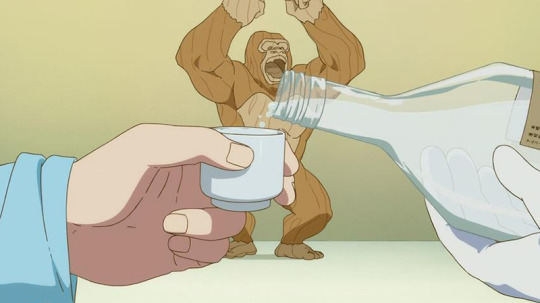
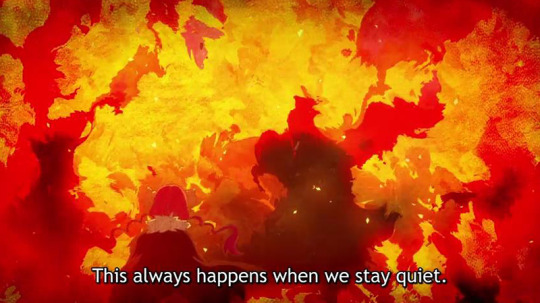
The “stay quiet” here is 大人し[い] otonashii, which takes the word for “adult” and adjectivizes it. It’s a common word with a variety of meanings, such as when something is “behaving” properly and not raising a fuss (from children to computer code to a chronic disease to political forces, all sorts of things) or when something comes across as “mature” (like a clothing design or a young person).
In this case the idea is that the dragons had chosen to “behave” and mind their own business, which (they seem to assume) led the humans into underestimating them and deciding to attack. (”Stay quiet” probably does a pretty good job of getting that across, but just to fill it out.)
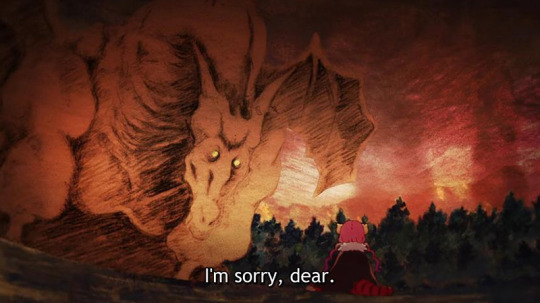
This is 残念ながら zannen nagara, or “unfortunately...”.
The reason I bring it up here, is that it’s not a particularly intimate way of speaking and leans somewhat formal—potentially implying Ilulu has no more close relatives left to give her this news (and/or maybe her family’s social position is one where other dragons had to treat them with respect).
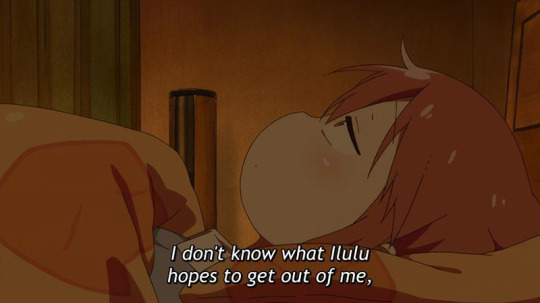
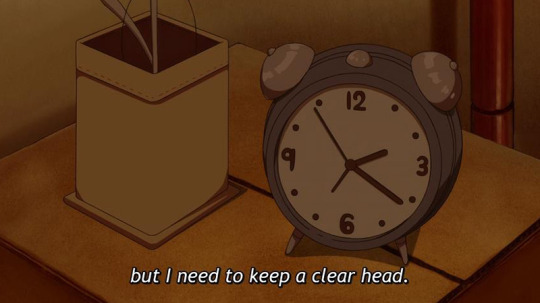
The second line here is 平常心を保つよ、私は, which is a fairly strong declaration of intent. I kind of feel like “I need to keep a clear head” sounds less confident, like convincing herself “ok bad situation, but if I just do this I’m fine.” In contrast, the Japanese imo is more of a “[Ilulu can do what she may,] but it won’t get it to me either way.” Just a mild point of characterization I suppose.
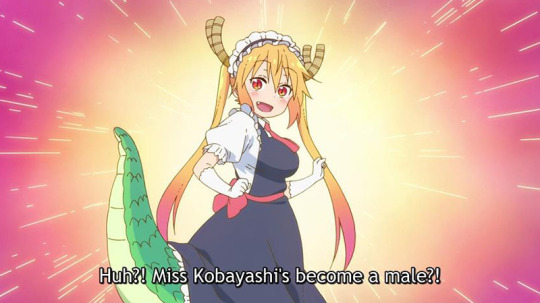
Just for clarity, she does use the word 雄 osu here, which is the more biological term for “in a sexually reproducing species, the one that produces sperm,” rather than a more gender-based term.
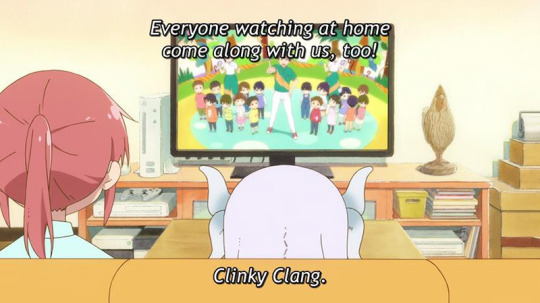
The TV show, シャシャシャシャキーン Sha-sha-sha-shakiin, is a combo reference to irl Saturday-morning kids’ variety show じゃじゃじゃじゃ~ン Ja-ja-ja-jaaN and weekday-morning シャキーン! Shakiin!.
The former’s name comes from the Japanese equivalent of ta-dah!, while the latter’s comes from the ”sound” for becoming alert, going from relaxed/sleepy/bored/etc. to “wide awake let’s go.” (though not necessarily sleep/wake related)
If you’ve seen these two emoji:
(´・ω・`) (`・ω・´)
The one on the right is the “シャキーン” one, and is the contrast to the gloomy one on the left (ショボーン shobon). Or these, going from asleep to awake:
( ˘ω˘ )スヤァ… (`・ω・´) シャキーン
In manga and stuff you’ll also see it used for e.g. someone drawing/brandishing a sword, striking a cool poses with a lens flare, things like that.
I think it gets translated to metallic-y sounds in English fairly often in those cases (like drawing a katana, or a mecha pose), hence the translation above.
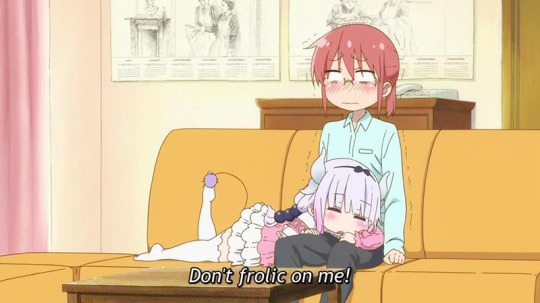
The verb for “frolic” here is じゃれる jareru (no relation to jajaan above), which is like to play/mess around, typically in a physical sense. For example it’s used in the compound word じゃれ合う jareau, which is often used in the same way English might say “playful wrestling” about kids or animals.
Though the word Kobayashi uses is actually a different じゃれる compound, じゃれつく jaretsuku, which is like playfully/affectionately grabbing/cuddling up/etc., (also primarily regarding kids or animals). There’s a bit of overlap with some of the uses of あまえる amaeru mentioned in the last episode’s notes.
Assuming I had the visuals, I’d probably just write this as “Please not on my lap...” or similar. (Kobayashi also uses a different verb conjugation for Tohru vs. Kanna in this scene, ~つくな vs. ~つかないで; Kanna’s being more plead-y compared to Tohru’s more “cut it out!” feel, hence the “please.”)
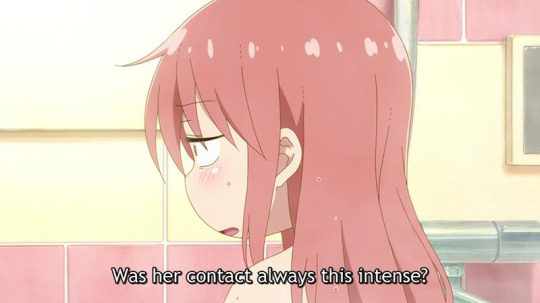
“Contact” here is “skin-ship,” a portmanteau-esque combination of skin and kinship or relationship. It’s primarily a Japanese word (you won’t find it in English dictionaries typically), but it was apparently coined by an American speaker at an international WHO seminar in 1953 (from which a Japanese attendee brought it back to Japan and it was later popularized).
The original use of the word was in reference specifically to parent-child physical intimacy, but as it became more widespread in usage the meaning extended to all sorts of relationships, from the platonic to the romantic.
One reason, presumably, that the term caught on so powerfully in Japan is that it has historically been a very touch-adverse culture (at least compared to say the US), and this extends even to parents with their children after the first few years. You’d see (and still see) psychologists recommend “more skinship” to people, for example.
The relative lack of skinship may partially explain the head pat thing mentioned in last episode’s notes (e.g. when you want to touch your kid, but hugs aren’t on the menu) and things like the old “hand-holding is lewd” meme. (Note this isn’t just me getting all orientalist here; there’s been a good bit of research on the skinship gap, and how it may be shrinking, by Japanese scholars.)
This line is also a bit of foreshadowing that Tohru has realized Kobayashi’s... situation already.
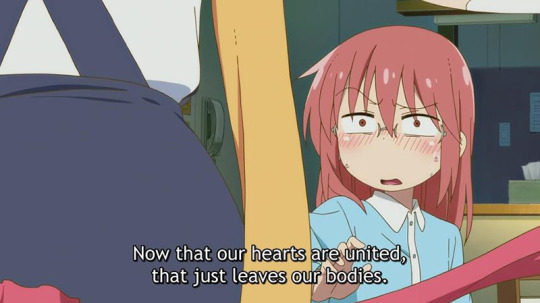
The Japanese here is 心と心でつながった後は体ですよ, which I only really mention because I kinda felt like the English’s “Now...” implied she was saying they only recently ‘connected their hearts,’ which I don’t feel from the Japanese wording and would say is probably not how Tohru thinks. E.g. more of a “Our hearts are already connected; now it’s time for our bodies!” kinda thing.
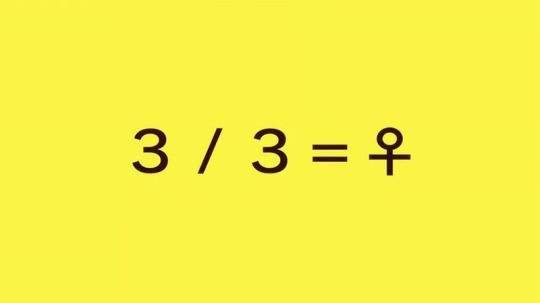
This 3/3 is March 3rd, which “equals” ♀ because that’s the date of Hinamatsuri, sometimes also referred to as Girl’s Day. The third day of the third month was originally a holiday brought over with the Chinese calendar, and it morphed from a more spring/peaches holiday into it’s more girl-oriented version at some point in the Edo period.
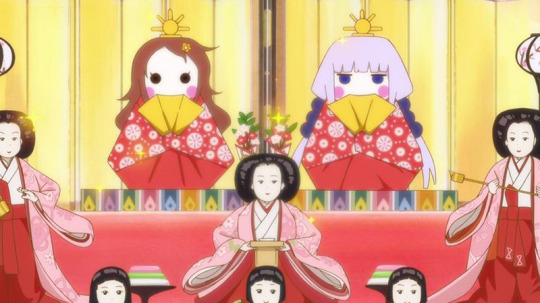
One of the highlights of Hinamatsuri is the doll displays, as pictured in this short bit with the Saikawa sisters. There are various types of displays, but this sort of staircase arrangement is the most common I believe. Each level has a certain type of doll that goes on it, with the top level having an “emperor” and an “empress” doll—which is the pair Riko replaces with dolls of herself and Kanna.
There’s some similarities between these doll displays and stereotypical Christmas trees: a family is likely to have a set of ornaments/dolls they mostly reuse each year, you put them up some time in advance of the actual holiday, then get lazy and leave them up too long put them away for a year after it’s over. A lot of businesses and such will put up displays as well.
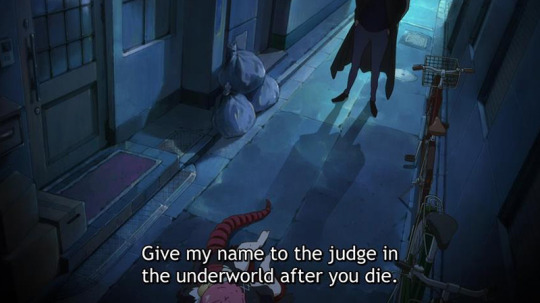
“The judge in the underworld” is left vague here and isn’t a specific reference to anything, but is generally in line with the typical “image” of what happens after you die (setting aside actual religious beliefs) in Japan.
Please see the documentary series Hoozuki no Reitetsu for more info.
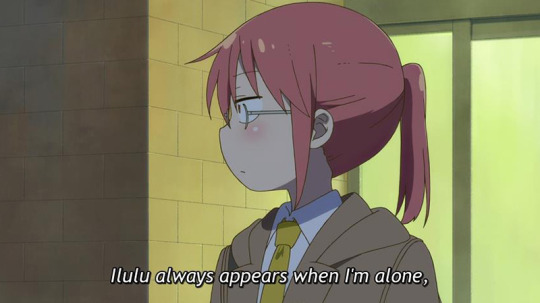
As of right now in the anime, Ilulu has only shown up twice, and only once of those when Kobayashi was alone. The implication seems to be that there have been other Ilulu encounters that we haven’t seen.
Also, for clarity, the Japanese is 私が一人の時にいつもイルルは来るから, which is more of a “whenever I’m alone Ilulu shows up” than a “she only shows up when I’m alone.” (The English could sorta be read either way I think?)
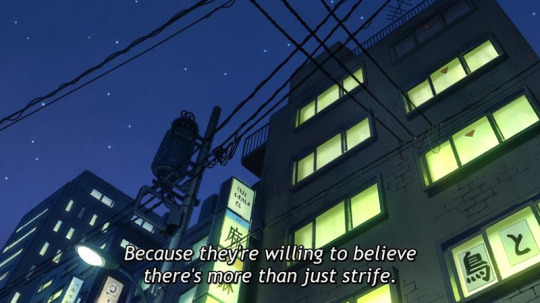
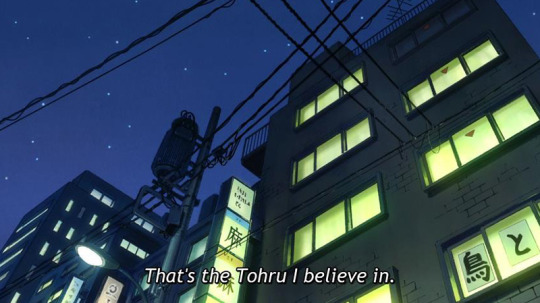
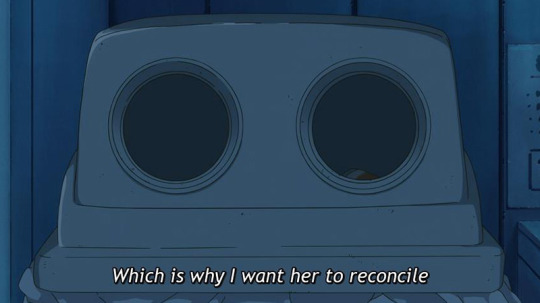
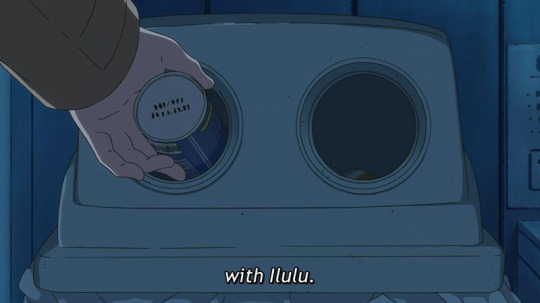
This bit is それだけじゃないって、争い以外もあると思ってくれているからだ。私はそんなトールを信じているから… だからその為にイルルと和解したい
The main point of contention I have with this English is that it implies Kobayashi wants Tohru and Ilulu to make up. However, I’d say this is more Kobayashi wanting to come to terms with Ilulu herself (and just by extension Tohru/the other dragons/maybe other humans).
That is, by making peace between herself the human and the “hostile” dragon Ilulu, she’d be helping prove Tohru’s belief correct—and she has faith in Tohru that it is (see also last season finale).
(Notably while Tohru is Chaos faction herself, there’s not really been another Chaos dragon yet to be convinced like this. Kanna is no-faction, Fafnir is technically no-faction even if Chaos-ish, Quetzalcoatl is an observer, Elma is Harmony, and Tohru’s father is an exception on multiple levels.)
Without getting too deep into the “why,” one quick thing I’ll point out is that she says 和解したい wakai shitai, not してほしい shite hoshii or させたい sasetai etc., meaning it’s something she wants to do herself, not want/make someone else do. Generally speaking you can’t use the ~たい “want to” form for anyone but yourself (you don’t know what anyone else is thinking, after all), unless quoting them, asking, or in the ~がる “seems to want to” form.

This is a 防犯ブザー bouhan buzaa, a crime-prevention buzzer, also known as a personal or self-defense alarm. They emit a very loud sound when activated. The idea is you, well, use it like she does here, when someone is trying to do a crime to you.
Since most Japanese children walk to school, it’s extremely common for these devices to given to students (either by parents or a gov’t body). It’s technically recommended for adults to carry them too, though the advent of the mobile phone has driven down carry rates.
This particular one was probably purchased in episode four of season one, if you want to rewatch and see why!
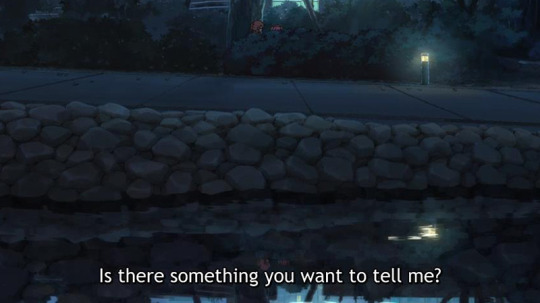
This is 私にぶつけたい気持ちでもあるの?in the Japanese.
The verb for “tell” is ぶつける butsukeru, an evocative word meaning ~to slam against (somewhat similar to “vent” in English when used with emotions/feelings).
The “something” is 気持ち kimochi, ~emotion/feeling/thought.
So the Japanese here feels a lot more expressive than "something you want to tell me,” I would say (that could just as easily be a translation of 話したいこと). That said it’s not an easy thing to express in English within the confines of the format here, especially if you want to keep the “target = ‘me’” part.
It might feel somewhat like “You got something bottled up you wanna hit me with?”, though I doubt if I’d use that either.
As a side note, the manga has Kobayashi say an extra line after this, about being the “main tank” to take her “hate” (Japanese for “aggro” in MMOs).
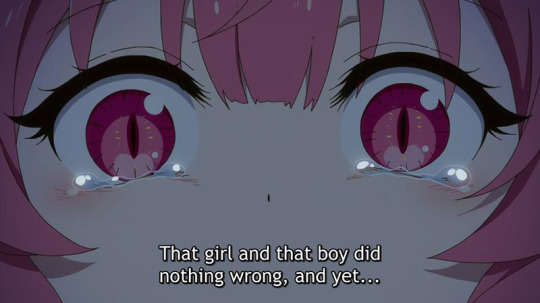
A small note that “that girl and that boy” is あの子とあの子 ano ko to ano ko, so no gender specification in the Japanese (it’s a good language for talking about people without specifying a gender!).

“Next time” here is 今度 kondo, which is an interesting word because you can situationally use it for “recently,” “this time,” “next time,” or “soon.”
The reason I bring it up here is the English “next time,” personally, leaves me thinking “Was there a previous time? What ‘next’ do you mean?”—just a heads up that that’s not really an issue in the original line.
Also: this whole extended scene with Kobayashi saving Ilulu is one of the “many senses” mentioned in the episode title. (see also episode one notes re ikemen)
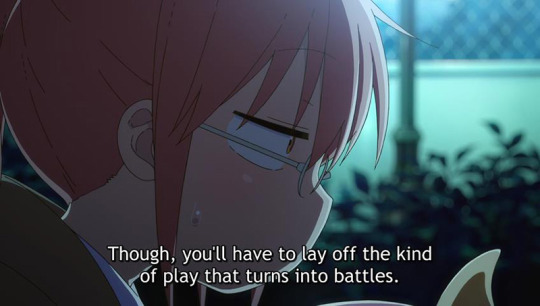
As an aside, this "play” is じゃれ合い jareai, the noun form of the jareau that was mentioned in the above “frolic” note.
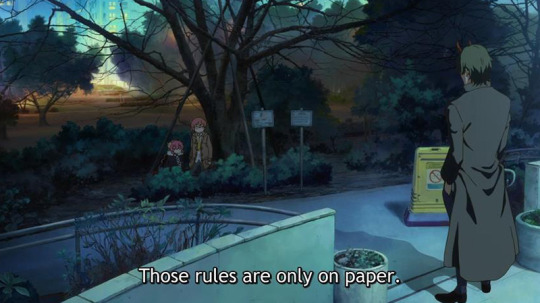
If you were wondering: “Do dragons use paper?”, the word here is 形骸化 keigai-ka, (almost) lit. ~reduced to bones, meaning something that once was strong/effective is now basically just a formality. It’s similar to the phrase “dead letter” in reference to old laws that aren’t really enforced anymore.
So two potential points of ~lore relevance~ here: 1) the rules probably used to be enforced, 2) we have no evidence (either way, from this) that they actually have them on paper somewhere.
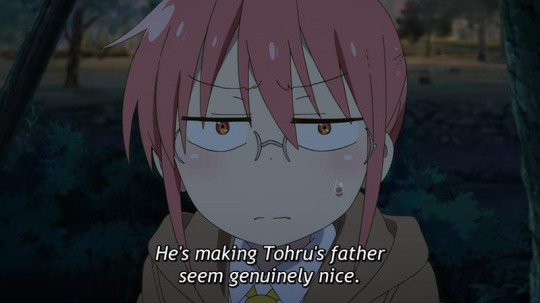
こりゃトールの父ちゃんは本格的に優しかったみたいだな
This might just be me reading too much into the English (again), but one difference in nuance between these two lines is that the English has Kobayashi implying Tohru’s dad “seemed” kind (which implies he’s not really kind, just kind in contrast to this villain), while the Japanese is more taking this as evidence that Tohru’s dad was actually being kind (see also last season finale).
For those wondering if the みたい in that line would imply a “seems”: it sort of does, but it applies across the whole observation here. I.e. “seems Tohru’s father was genuinely nice” vs. “making Tohru’s father seem genuinely nice” (which I’d guess would probably use 優しく見えてくる or something).
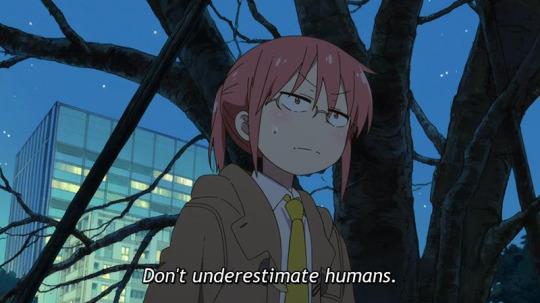
When you see “underestimate” in anime, most of the time it’s ��める nameru. It comes from the verbified archaic adjective 無礼し nameshi, meaning a combination of looking down on, acting rude towards, etc., and uses the same characters as “rude” (though often written in hiragana/katakana).
It also is a homonym of the verb “to lick,” so “Don’t underestimate humans” sounds identical to “Don’t lick humans.”

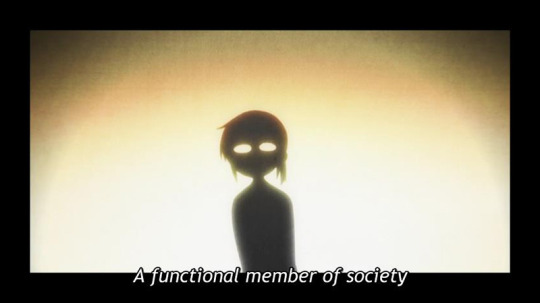
“Functional member of society” is 社会人 shakaijin, ~lit. person of society, which is a very commonly used word to refer to basically anyone who is an active member of society. It includes homemakers, so it’s not strictly “has a job at a company,” but in many contexts it’s used like “people with jobs” versus “students and NEETs.”
(Not that there’s anything wrong with the translation, just some extra context.)
A technique reminiscent of this shadow puppet silhouette style was also used in Hyouka, another Kyoani show and one directed by the late Series Director Takemoto Yasuhiro.
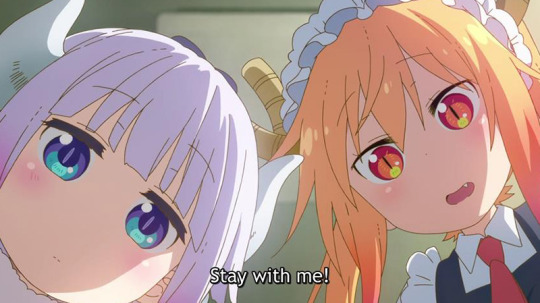
I kind of feel like yelling “Stay with me!” at someone injured is something you do when they’re in danger of fading away, not when they’re waking back up? Maybe that’s just me.
The Japanese is お気を確かに o-ki wo tashika ni, a polite (since Tohru almost always speaks kinda formally to Kobayashi, as part of the maid thing) way of saying “pull/hold it together,” and is used in a variety of situations.
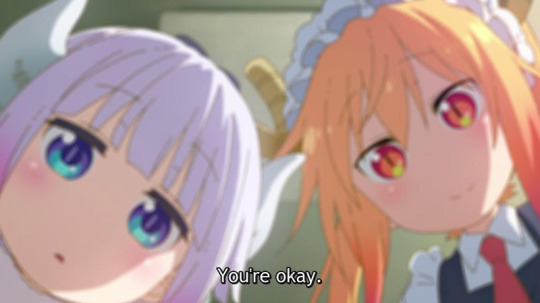
Kanna’s line is a question (e.g. like “are you okay?”) in the Japanese here, whereas the English sounds more like something you say to someone who’s injured to try to reassure them.
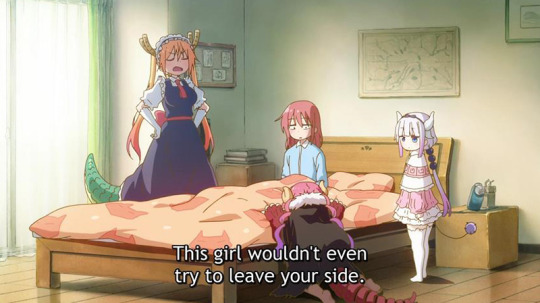
This line is その子離れようとしないんです sono ko hanareyou to shinai n desu.
The English is a pretty literal translation: hanareru is the verb for leaving/separating (in some senses), and the ~you conjugation means “try to ~”. However, that conjugation also has a second use in just indicating intent—especially when used in the negative, like here—so e.g. “She didn’t want to leave your side,” or “She wouldn’t leave your side at all.”

(◎Д◎)
Just in case: this is an emoji for expressing shock.
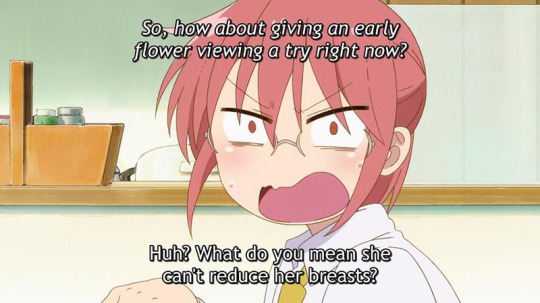
One thing that is left out of the English in this line is the だけ dake, “only.”
So Kobayashi’s not necessarily surprised at this by itself, but in contrast to the fact that Tohru says she probably can hide her claws/tail (so why not this too?).

The base phrase Tohru is saying here is 私たちの仲じゃないですか, which roughly means “that’s just our relationship,” and is used commonly when being thanked for doing a favor for someone close. It’s similar in meaning to something like “hey of course, no problem, I know you’d do the same for me.”
Tohru puts a little spin on it by adding the “eternal” to make it 永遠の仲, which is a separate phrase that means probably what you’d think it means.
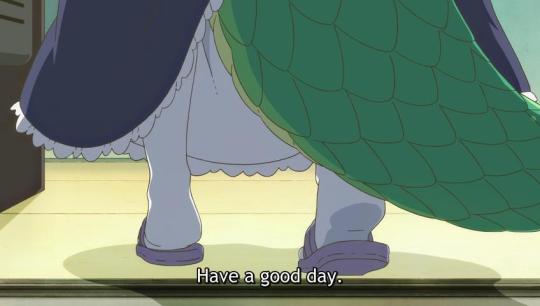
This quick cut to Tohru’s feet and the light “foot pop” motion... I have a hard time believing it’s anything but the director trying to give some subtle “goodbye kiss when leaving for work” vibes, even if they aren’t literally kissing. Just me?
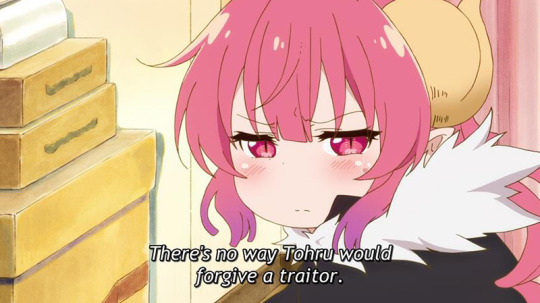
Here she says あのトール ano Tohru, lit. “that Tohru,“ which in this sort of context carries a meaning similar to using an italicized “that” in English: not just any Tohru, but that Tohru, the famous one. The implication is that yes indeed Tohru is well-known among other dragons—and known to be quite strong and merciless.
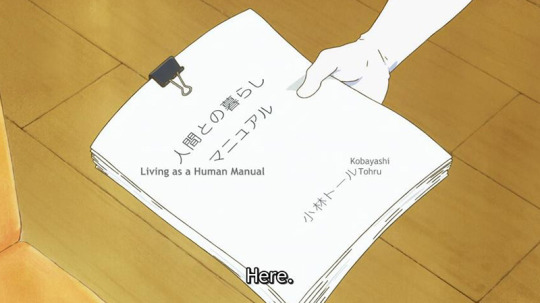
It’s not a particularly big deal, but technically this is 人間と, i.e. Living with.

The ball hands thing is generally thought of as “Doraemon hands” in Japan. Doraemon gets the name from the food “dorayaki,” but “Dora” is also how you pronounce the first two syllables in “Dragon” (ドラゴン doragon).
Keep this in mind.
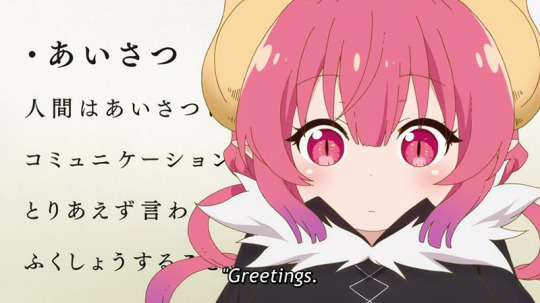
挨拶 (あいさつ) aisatsu, often translated as “greeting(s)”, is a lot bigger of a thing culturally for Japan than it might be for where you live. Though translated as “greetings” it also includes farewells and more. Basically a general term for “in X situation, say Y” style semi-set phrases.
In more traditionally minded companies, for example, employees are often expected to give a rote ohayou gozaimasu when they arrive (even if they think no one is around to hear it), and may get chewed out for not doing so or half-assing it. Then when passing someone in the hallway etc., an otsukare-sama desu, and yet another phrase when leaving for the day. Also the ittekimasu and itterasshai (when leaving home/saying bye to them) or tadaima and okaeri (returning home/welcoming back) that probably many anime-watchers are familiar with. Even itadakimasu is an aisatsu.
Obviously every culture utilizes “greetings” like this, but in Japan they’re pretty heavily ritualized and treated as a cornerstone of human relations, a key part of showing respect for your fellow humans (even people you hate!) and ensuring the smooth working of society. It’s not the thing they chose to have Tohru put first in her “living with humans [in Japan]” notebook for nothing!

The English “the” is a popular word to use in Japanese as an intensifier, similar to how it’s used in a sentence like “this isn’t just an [example], it’s the [example]!”
It’s usually pronounced “za” and often written that way in katakana (ザ) for this usage. (If you type “za” in a Japanese IME, most will offer up “the” as one of the options to convert the text to, even.)

The word she says here is 喝 katsu, which, in this sense, is a stereotypical thing for a Zen teacher to say to a student as a stand-in for explaining some deep Zen concept that words can’t describe. So here, it’s kinda like “Yes this may seem contradictory, but really it’s just too complicated for you! No more questions!”
Obviously that’s oversimplified and it’s used in other ways too (see Saikawa’s father during the sports festival), but just for the purposes of this joke, there you have it.
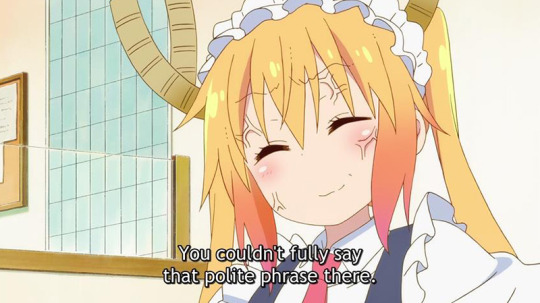
The word used in the Japanese here is 建前 tatemae. If you’ve ever studied any Japanese, you’ve likely heard about honne vs. tatemae, your inner feelings vs. the front you put up for social reasons.
People new to the language are sometimes prone to approaching that distinction with “well why doesn’t everyone just honne all the time, why play games?”, but of course almost everyone splits themselves like this. You probably hate your boss, but you also probably don’t tell them that to their face to avoid getting fired. Or maybe you have some family members you can’t stand, but act nice around anyway because it’s not worth the trouble to start fights.
Japan just put names to the idea, and maybe leans a little more toward encouraging tatemae in more situations.

This is せいぜい悩むんですね.
せいぜい seizei as an adverb means doing something to utmost extent one is capable of. You’ve likely heard it from a villain somewhere saying something like “Struggle all you like, wahaha!”.
Though it’s not necessarily down-talky like that, in modern times that is the trend (you can use it for yourself no problem, but if used to talk about someone else’s actions it may come off as belittling). Tohru, as one of the strongest beings in the setting and with the pride to match, uses it a lot.
悩む nayamu is to worry, fret, ruminate over (some difficulty etc.).
The sentence in general is one that is highly context dependent, but here it’s Tohru thinking to herself, somewhat impressed, that Ilulu is actually putting serious thought into the question of what she wants to do with her life.
And, as the background suggests, finding it surprisingly adorable/admirable; up until just a few days ago, Ilulu was known as one of the most extremist Chaos faction dragons obsessed with nothing but destruction, yet look at her now. In a way, Tohru’s taken over an older sister kind of role for her.
(For the curious, if the ね was dropped or swapped to a よ here, that would imply she was directing the comment “at” Ilulu, rather than saying it in observation.)

The word here is 契る chigiru, which usually means to swear/pledge (e.g. swear a pact, pledge your love), but can also be a somewhat fancy word for having sex, especially of a married couple.
I feel like I personally would have used more of a euphemism for the translation.
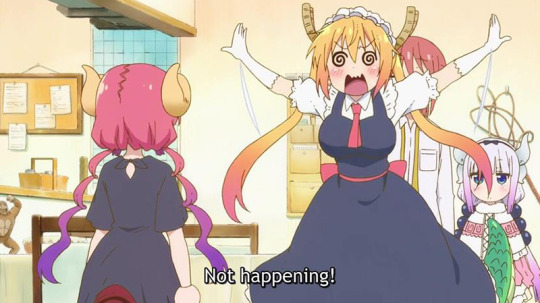
The phrase here is ダメの助 dame-no-suke, where dame is no/bad/can’t do/useless, and (no)suke is a common ending to first names; both actual names and sort of on-the-spot nicknames; someone looking sleepy might be called a 寝坊助 nebou-suke in the same way as “sleepyhead.”
Or, as here, sticking to the end of things for comedic effect or as indication of a panicked/confused thought process.

( ° ρ ° )
Just in case: this one is also expressing shock, but a kind of dumbfounded shock. The ρ is a drooling, slack-jawed mouth.
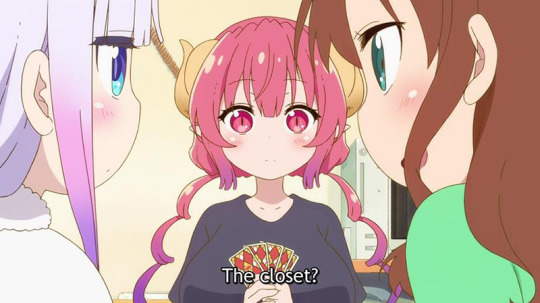
In the next episode preview they talk about where Ilulu will sleep, since they don’t have room for another bed. Ilulu wants to sleep in the closet—or more specifically, the 押し入れ oshi-ire, which is a particular closet layout you’ll find in many Japanese bedrooms.
The typical difference is that an 押し入れ was originally designed for 和室 washitsu, traditional-style Japanese rooms with tatami floors, primarily as storage space for folded-up futon/blankets/pillows, as you would put those away during the day to free up space. Thus they typically are rather wide, mildly deep, and have a waist-height, solid horizontal divider capable of supporting a lot of weight.
They actually are pretty okay for sleeping in if you’re not claustrophobic or tall.
Anyway, I bring this up because you know who else very famously sleeps in one of these? That’s right: Doraemon.
#maidragon#kobayashi's dragon maid#kobayashi-san chi no maid dragon#miss kobayashi's dragon maid#anime#translation notes#season 2
18 notes
·
View notes
Text
SECOND, I THINK, IS THAT WEB PAGES ARE JUST GOOD ENOUGH
The desire for speed is so deeply engrained in us, with our puny computers, that it will be more room for what would now be considered slow languages, meaning languages that don't yield very efficient code. The reason this got stale in middle school and high school, I let myself believe that my job was to be able to solve it. Lisp has changed a lot. That last advantage may turn out to be as cheap as possible, the same status as what comes with it. In a startup writing Web-based software is never going to be something that is going to need to do this if we want to fix the world behind the statistics, we have to do anything. YC. If you get an offer from a reputable firm at a reasonable valuation with no unusually onerous terms, just take it and get on with building the company. It's because staying close to the main branches of an evolutionary tree. Of course the question of how to choose startups presumes you have startups to choose between. And for these releases, the mere unfolding of some innate genius.
They have no idea how wide this band is, but one thing I would really love to do, personally, is discover a new abstraction—something great meaning either that someone wants to buy half your company, how much does that investment have to improve your average outcome enough that the 100-n % you have left? They will be the last to realize it, however, just as you did. I use the number of false positives will not tend to be owned by one of them. Early stage startups are the exact opposite of this. It is not unusual for an old Raleigh three-speed in good condition, and sent me an email offering to sell me one, I'd be delighted, and yet it was already mostly designed in 1958. Does that mean you should release something full of bugs, but they were very deep. Fortunately it's usually the least committed founder who leaves. We had to think about what killed most of the startups who believed that. A program is a formal description of the problem. History of Ancient Britain. A Photoshop user needs Photoshop in a way that's incompatible with this curve.
False positives are innocent emails that get mistakenly identified as spams. If it isn't, imagine what you would say, and use that instead. That's how programmers read code anyway: when indentation says one thing and delimiters say another, we go by the indentation. Use your software yourself, all the time and then it can take years to figure out what. The games played by intellectuals are leaking into the real world doesn't work that way. What they need is a language that might go away, as so many programming languages will there be in a rush to choose your life's work. There's nothing like users for convincing acquirers. If they get confused or bored, they won't. This time it felt like a family. You never do your best work in a fight, because fights are not sufficiently general. Give the Programmer as Much Control as Possible.
Most startups fail because they don't make something users want. There is also a complementary force at work. You see it in sponsored research too. If widely used, auto-retrieving filters became widespread, they'd become auto-unsubscribing filters. If you want to build great things, it helps to be driven by a spirit of benevolence. That was new. Software is a different business. They're like someone stuck in an abusive relationship. All you'll need will be something with a keyboard, a screen, and a great many configuration files and settings. There is a kind of pleasure here too. It's fabulous.
A lot of startups writing mainframe applications. For example, the rate at which individuals can create wealth depends on the rate at which you have to go find individual people who are famous and/or language level support for lazy loading. Strings only exist for efficiency. To become popular, a programming language probably becomes about as popular as it deserves to be. So I propose that as a high school student? Some changes might be bigger than others, but the length in characters, of course, is that there are more than fifteen words with probabilities of. They won't be as committed; they'll need to be support for it at the language level.
One interesting consequence of this fact is that there are always some that seem to outsiders to be fine, whatever else you do or don't do. For example, a language in which indentation is significant, like Python, would not work very well together. It was no coincidence that the great industrialists of the nineteenth century had so little formal education. If the hundred year language were available today, would we want to fix the world behind the statistics, we have to look at the history of stone tools, technology was already accelerating in the Mesolithic. By feature I mean one unit of hacking—one quantum of making users' lives better. There's a hack for being decisive when you're inexperienced: ratchet down the size of the parse tree. No one uses pen as a verb in spoken English.
Suspecting that the papers published by literary theorists were often just intellectual-sounding nonsense, and submitted it to a friend. It doesn't make a very big difference to the bottom line how many users they can support per machine will be the Facebook, with some way to give the compiler optimization advice that will allow it to lay out strings as contiguous bytes if necessary. We have to have extracurricular activities. The three most prominent people I know. I have no idea how wide this band is, but one thing I would really love to do, identify a core that's both a useful on its own and b something that can be created. There have always been occasional cases, particularly in the US own one. Instead of working back from a goal, work forward from promising situations. So far we've cut the Standard Graduation Speech down to, what someone else can do, you can at any given time get away with being more informal. They can't tell how smart you are.
Thanks to Alex Lewin, Ryan Stanley, Jessica Livingston, Sam Altman, and Patrick Collison for sparking my interest in this topic.
#automatically generated text#Markov chains#Paul Graham#Python#Patrick Mooney#software#US#force#wealth#lot#fights#band#Sam#course#files#hack#Ryan#Control#startup#world#A#parse#language#settings#users#family#life#delimiters#idea
3 notes
·
View notes
Text
1 Year of Learning Korean
One of the most popular questions I’ve gotten since coming back from Korea is: Are you fluent in Korean now??*
*Spoilers: I am not. 🙃
Looking back, I probably would have become more conversational if I had just done a 3-month intensive program. Although, compared to just learning by myself in the Bay Area, being in Korea definitely gave me more opportunities and motivation. I was placed in the high intermediate class for orientation (switched to low intermediate), but I would say that I’m now truly at an intermediate level. I think my Korean’s more or less the same as my Japanese (which has regressed a lot, and I only took 3 semesters in college) but with very shaky foundations.
Anyways, here’s a brief timeline of what I did this grant year. Let’s go~
[Initiate lock n’ load montage]
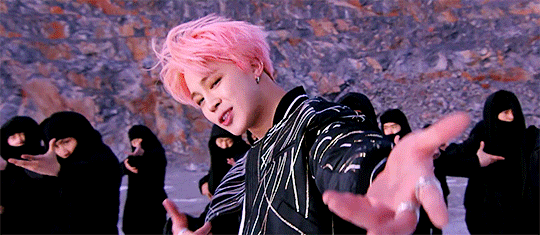
July
Korean Intensive Program (8-12pm, 1-2pm M-F)
Because of how the program was structured, I didn’t feel like I learned very much. This is partly why my foundation is so full of holes...we skipped around here and there.
August
Korean Intensive Program
September
Korean was put on pause due to troubles adjusting to homestay
October
Occasionally did a few chapters of Billy Go’s Korean Made Simple at school
Studied some Korean vocab
November
???
December
I don’t think I studied Korean at all
January
Got a wakeup call when I spent 5 minutes trying to read the back of a sign at a smoothie shop and realized how slow I was at reading
February
Vocab grind (1000 Essential Korean Words), plan was to finish by the end of March. Two weeks of intense vocabulary cramming on Quizlet (did nothing in the end lol don’t try that)
Bought the Real Life Conversations Intermediate book
Studied Korean in Kpop lyrics
Started a side coding project to help my touch typing (K-pop lyric typing game)
March
Memorized dialogues from Real Life Conversations book with Lauren
Improved reading skills slightly by listening and following along with the audio recordings that come with the book
Read through the dialogues with the Korean literature teacher in my gyomushil
Continued to learn song lyrics
Wrote sentences with each new vocabulary word, got my co-teacher and the Korean literature teacher to check them (<-this was probably the most helpful game changer...it helped a lot with my spelling too)
Continued working on the K-pop typing game
April
Stopped learning new vocab at around Chapter 11 of Essential Words, focused on retaining old vocab through Anki flash cards
Finished the Go! Billy Korean Made Simple book that I bought ages ago (tbh it was too easy for me at this point but I was just too lazy)
Finally sat down and “learned” Korean verb conjugations (I’d just been going by gut instinct before…tbh I still kind of do 😅)
Kind of dropped the typing game after finishing the MVP 😅but I’m gonna try to finish it up now that I’m back
May
Started to panic about leaving Korea in 2.5 months but still sucking at Korean
Signed up for private lessons once a week for 90 minutes (My tutor asked me to give her a shout out. Her name is 서영심 ([email protected]). If you’re in the Cheongju/Ochang area, she comes to you! She’s very professional and you’ll get your money’s worth.)
Started at the intermediate book that focused on grammar
Learned ~5 grammar points every week
Started writing and reading a lot more and actually seeing how words are spelled. The first time I saw 여기--a super common word (yogi) that means here--written out I thought it was so strange...not that I had thought it was 요기 (also pronounced yogi) but I just didn’t have a visual of it in my head, I guess.
June
Depressed about lack of improvement
Continued with private lessons but felt like I wasn’t really retaining the grammar dump from each week
At the very least, Korean homework kept me on track and made me practice even when I didn’t want to
Started Anki again since I hadn’t actively studied vocab since April.
An old K.Will song that I hadn’t listened to for a long time came up and I realized I could suddenly understand the lyrics. That was pretty cool and one of my small win moments.
July
Feeling pretty hopeless with Korean
However, hung out with more Korean friends that only spoke Korean and felt like I was actually able to contribute to the conversation. (3 hours of Korean Listening ...🙃)
Was able to understand 70% of the conversation at my gyomushil’s final farewell lunch for me. I contributed to the gossip!
Went home and immediately lost 50% of my Korean skills upon touching U.S. soil.
So basically, after my burst of inspiration in February, my confidence and motivation in Korean just kept plummeting. Even now as I write up this post I feel an overwhelming sense of hopelessness. But I do want to highlight the progress that I’ve made since orientation.

Korean Reading
We were all supposed to be able to read Hangul before we came to Korea. Being able to recognize the alphabet is different from being able to read and also different from knowing the pronunciation rules and where to pause in your reading. During my first semester, my eyes would automatically glaze over whenever I saw Korean text. When the second semester started, I tried to force myself to read everything I came across - storefronts, street signs, advertisements on buses, etc. Even if I didn’t know what it meant, I would force myself to read it. Right now, I can navigate a Korean shopping website and read a menu semi-comfortably. I’m still waiting for the day when I’ll see English sounding hangul and be able to read it as fast as English. Although, I will say it’s really nice to be able to read the Korean titles in Kpop videos on Youtube, especially when I come across really old songs (like Super Junior’s No Other 너 같은 사람 또 없어) and realize I now know what it means.

Also, a new world that has opened up to me is...노래방!! Karaoke is such an adrenaline rush. I’d compare it to sight-reading or DDR/rhythm games where you know something is coming up and the satisfaction you get when you get it right with the beat of the music is 👌. It’s so gratifying to be able to sing along...거기 너 I FANCY YOU 아무나 원하지 않아 HEY! I love you (LOVE YA)!!
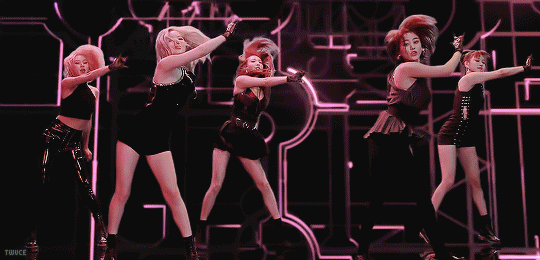
Korean Writing
Back during orientation, I couldn’t spell anything on my own. I knew words every koreaboo knew like 어떻게 and 괜찮아 but I couldn’t write it because I didn’t know how spelling worked. It’s no wonder my spelling didn’t improve since a) I didn’t write and b) I didn’t even read. Even now I still make a lot of spelling mistakes, but I pay attention to words when I see them. It’s still a very slow process, but now I can picture the hangul in my head when I think of the word.
Typing: I started orientation with around 15 wpm, then by the end of orientation I got to around 30 wpm. Currently, I’m at 60 wpm when I start cold and after I get warmed up I can go up to 80wpm. Being able to touch type is so useful, especially when I’m typing up long sentences from my textbook and I don’t have to look up.
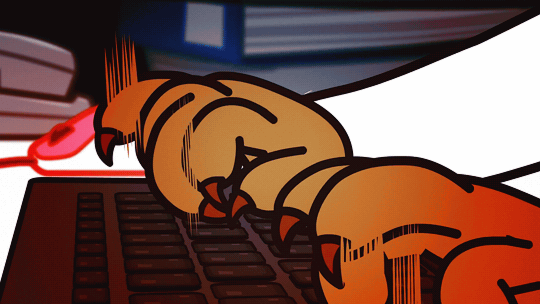
Korean Listening
Dare I say...my Korean listening is my strongest point??? I remember when I took French listening tests in high school, I would always lament with everyone else that they spoke too fast for me to understand. But interestingly, for both Japanese and Korean, I never had that problem. If it only contains words and grammar I know, I can understand it perfectly fine even if it’s fast. I intuitively understand most Korean verb endings and exclamations so it’s not hard to know which way the conversation is flowing or when to interject with “세상에,” “맞아 맞아,” or “말도 안돼.” I used to think my poor lack of vocabulary was the number 1 thing blocking me from understanding, but then I learned more grammar and realized the things I didn’t know. I do feel like parts of the fog are being lifted...sometimes...

Korean Speaking:
I still feel pretty embarrassed when I speak Korean because there are some sounds that I can’t pronounce. Compared to orientation, I have a few more stock phrases tucked and ready to go, but I still feel unable to express myself. Every conversation will start out fine, but they’ll all stagnate to the same topics and sentences after a while.

Complications with other languages
I talked about how knowing some Japanese and Chinese was both an advantage and a disadvantage during my beginning stages, but this is true even now.
Ever since I started getting more comfortable with typing and spelling Korean, I’ve started seeing the actual Hangul in my head when I think/hear Korean. I’ve also started to associate the locations of the Hangul characters with their locations on the Korean keyboard.
One day, I was trying to text back my mom with “那是什么?” (Na Shi Shen Me/What’s that?) but was confused because those characters weren’t showing up. Then I realized I was typing “sk” instead of “na.” Some of you guys might get it....because “s” is where ㄴ(n) is and k is where ㅏ(a) is on the Korean keyboard. Clearly, my brain can’t handle it. It’s interesting because both the Japanese and Chinese keyboard uses the same alphabet placements as English.
Another time: I was watching a Talk To Me in Korean video where Hyunwoo talked about how 하다 is a very versatile verb. I immediately thought about how the Japanese equivalent is 수루 and even mentally mapped it out on the Korean keyboard...before realizing this is WRONG, WRONG, it’s する not 수루 LOUISE WHAT ARE YOU EVEN DOING. (They are both pronounced suru)

What’s next?
Now that I’m back in the States, it’s going to take even more determination and self-discipline to keep up with my Korean. But I really don’t want everything I’ve worked towards to just wash down the drain. I’ll aim to finish my intermediate grammar textbook and grind anki flashcards. Hopefully, I can find a language partner or a study group. We’ll see!
#language learning#studying Korean#korean#fulbright korea#sorry for the long post#but yes i am back in california#also which one of you messaged isabel about my blog#thanks for reading whoever you are!!#also shout out to my buddy#i actually have one more post to make on my school festival#and then i'll wrap up this blog#learning korean
5 notes
·
View notes